- Media & Industry
- Meetings & Events
- Select Language 简体中文 繁體中文(香港) 繁體中文(臺灣) India (English) Bahasa Indonesia 한국어 ภาษาไทย Tiếng Việt Singapore (English) Philippines (English) Malaysia (English) Australia/New Zealand (English) Français Deutsch Italiano Español United Kingdom (English) Nordic countries(English) Canada (English) Canada (Français) United States (English) Mexico (español) Português العربية Japan(日本語) Global (English)
- India (English)
- Bahasa Indonesia
- Singapore (English)
- Philippines (English)
- Malaysia (English)
- Australia/New Zealand (English)
- United Kingdom (English)
- Nordic countries(English)
- Canada (English)
- Canada (Français)
- United States (English)
- Mexico (español)
- Global (English)
- Fujiyoshida
- Shimonoseki
- Ishigaki Island
- Miyako Island
- Kerama Island
- Tokyo Island
- Koka & Shigaraki
- Hida Takayama
- Ginza, Nihonbashi
- Beppu & Yufuin (Onsen)
- Ginzan Onsen
- Nagasaki Islands

- Kumano Kodo
- Shikoku Karst
- Amami Oshima
- Hachimantai
- Omihachiman
- Aizuwakamatsu

- Diving in Japan
- Skiing in Japan
- Seasonal Flowers in Japan
- Sustainable Outdoors
- Off the Beaten Track in Japan
- Scenic Spots
- World Heritage
- Home Stays & Farm Stays

- Japanese Gardens
- Japanese Crafts
- Temple Stays
- Heritage Stays
- Festivals and Events
- Theater in Japan
- Japanese Tea Ceremony
- Cultural Experiences in Japan
- Culture in Japan

- Local Cuisine Eastern Japan
- Local Cuisine Western Japan
- Local Street Food
- Japan's Local Ekiben
- Japanese Whisky
- Vegetarian and Vegan Guide
- Sushi in Japan Guide
- Japanese Sake Breweries

- Art Museums
- Architecture
- Performing Arts
- Art Festivals
- Japanese Anime and Comics
- Japanese Ceramics
- Local Crafts

- Scenic Night Views
- Natural Wonders
- Theme Parks
- Samurai & Ninja
- Iconic Architecture

- Wellness Travel in Japan
- Japanese Ryokan Guide
- A Guide to Stargazing in Japan
- Relaxation in Japan
- Forest Bathing (Shinrin-yoku)

- Experiences in Japan
- Enjoy my Japan
- National Parks
- Japan's Local Treasures
- Japan Heritage
- Snow Like No Other
- Wonder Around Japan

- Visa Information
- Getting to Japan
- Airport Access
- COVID-19: Practical Information for Traveling to Japan
- Anime Tourism
- Countryside Stays
- Accessible Tourism
- Hokkaido Great Outdoors
- Scenic World Heritage in Tohoku
- Shikoku’s Nature and Traditions
- Southern Kyushu by Rail

- Traveling by Rail
- How to Travel by Train and Bus
- JR Rail Passes
- Scenic Railways
- Renting a Car
- Sustainable Travel in Japan
- Travel Brochures
- Useful Apps
- Online Reservation Sites
- Eco-friendly Accommodation
- Luxury Accommodations
- Traveling With a Disability
- Hands-free Travel
- How to Book a Certified Tour Guide
- Volunteer Guides
- Tourist Information Center

- Japanese Manners
- Spring in Japan
- Summer in Japan
- Autumn in Japan
- Winter in Japan
- Cherry Blossom Forecast
- Autumn Leaves Forecast

- Japan Safe Travel Information
- Safety Tips for Travelers
- Japan Visitor Hotline
- Travel Insurance in Japan
- Accessibility in Japan
- Vegetarian Guide
- Muslim Travelers

- JAPAN Monthly Web Magazine
- Arts & Cultures
- Nature & Outdoor
- Festivals & Events
- Insider Blog
- Things to do
- Local Guides
- Food & drink
- Traditional
- Hokuriku Shinetsu

My Favorites
${v.desc | trunc(25)}

Planning a Trip to Japan?
Share your travel photos with us by hashtagging your images with #visitjapanjp
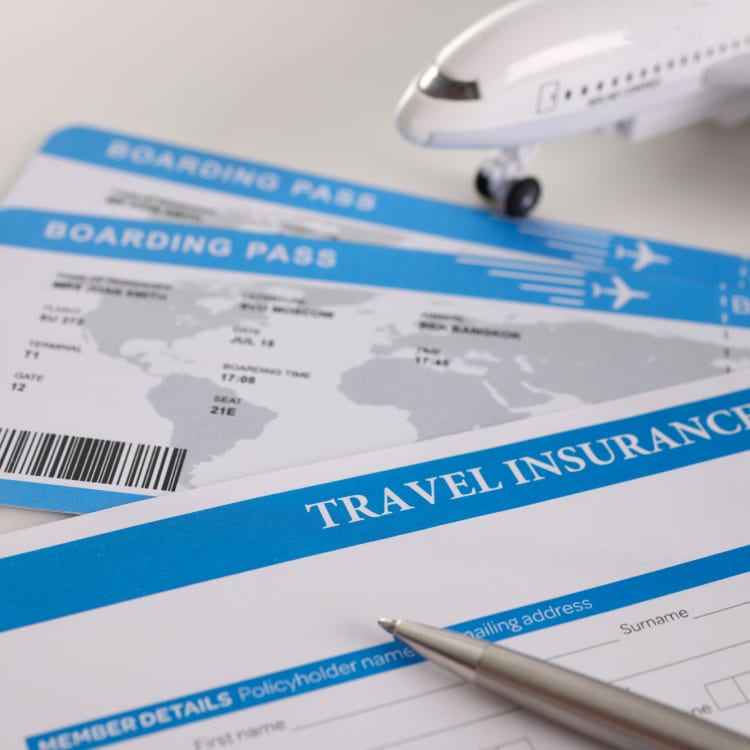
Protect yourself from potential risks with travel insurance
- Helping You Plan
It is strongly recommended that all travelers to Japan get travel insurance
Protect yourself from potential risks.
Travel insurance is a potential lifesaver when accidents happen
You can also sign up once you arrive.
Is it likely you'll get sick or injured while traveling?
While traveling is a thrilling experience, if you get sick or injured, you could get hit with hefty medical expenses. According to the survey by the Japan Tourism Agency, one in twenty people suffers from sickness or injuries while abroad. Medical service in Japan is advanced, but treatment can be expensive. For that reason, preparing in advance by organizing travel insurance is a wise decision.
Some credit card companies also offer travel insurance coverage. Please ask your card provider for further details on the insurance coverage before leaving.
Since 2021, foreigners who have unpaid medical expense in Japan may be restricted or refused entry to Japan.
Buying insurance after you arrive
It's possible to purchase insurance after you've arrived in Japan.
Know what your insurance covers and what it doesn't
Travel insurance covers medical expenses and compensation for the damage that occurs during your trip. It's a separate and different product from any health insurance you might have at home.
It's important to know what your insurance covers and exactly how they will pay you. If you buy travel insurance in your country, please check with your insurance company for their specific policies, before embarking on your trip. Some policies cover round-trip flights or transport from your home to the airport, while others won't. Here are some important things to know.
Know how to contact your travel insurance provider. Keep their emergency contact phone number on your person.
Know how your travel insurance provider will pay for your medical costs. Do they provide a “Cashless service”? That's when your insurance directly pays out to the medical providers on your behalf. Other insurance providers may require you to pay upfront, and some clinics don't accept credit cards. Cashless service travel insurance removes those concerns.
If you have a chronic disease, this will affect your travel insurance coverage.
Find out if your insurance covers your planned activities. Some particularly dangerous activities may not be covered.
Know if your insurance provides compensation for damages or injuries to third parties.
When you are sick
If you become injured or feel ill, it's helpful to know whom to call. The number to dial for an ambulance is 119, but the type of medical institution you need differs depending on the hour of the day, the level of severity, and if it's an emergency. For more information on finding appropriate medical assistance, see “For safe travels in Japan” or other links stated below.
Translation for medical issues in Japan
If you become injured, not speaking Japanese will complicate things and in some cases even delay you getting help! While some medical facilities offer services in foreign languages, not all do.
Safe travel advice
Did this information help you.
out of found this information helpful.
Thank you for your feedback.
Recommended for you.

Please Choose Your Language
Browse the JNTO site in one of multiple languages
Advertiser Disclosure
Many of the credit card offers that appear on this site are from credit card companies from which we receive financial compensation. This compensation may impact how and where products appear on this site (including, for example, the order in which they appear). However, the credit card information that we publish has been written and evaluated by experts who know these products inside out. We only recommend products we either use ourselves or endorse. This site does not include all credit card companies or all available credit card offers that are on the market. See our advertising policy here where we list advertisers that we work with, and how we make money. You can also review our credit card rating methodology .
Best Travel Insurance for Japan: Your Worry-Free Guide
Jessica Merritt
Senior Editor & Content Contributor
116 Published Articles 572 Edited Articles
Countries Visited: 4 U.S. States Visited: 23
Michael Y. Park
27 Published Articles 442 Edited Articles
Countries Visited: 60+ U.S. States Visited: 50

Table of Contents
The 5 best travel insurance policies for japan, is travel insurance for japan worth it, japan travel insurance costs, what japan travel insurance covers, how to get travel insurance for japan, final thoughts.
We may be compensated when you click on product links, such as credit cards, from one or more of our advertising partners. Terms apply to the offers below. See our Advertising Policy for more about our partners, how we make money, and our rating methodology. Opinions and recommendations are ours alone.
Planning a trip to Japan is exciting, as a rich cultural heritage, vibrant cities, and breathtaking natural settings await you. Though generally considered a safe travel destination , a trip to Japan can still be perilous, as you could encounter natural disasters such as earthquakes or typhoons, travel delays, injuries, or illness. Before you take off for the Land of the Rising Sun, look into travel insurance that can offer reassurance and relieve some of the uncertainties of international travel.
While travel insurance isn’t required to visit Japan, getting it can safeguard your travel investment and give you peace of mind as you travel. Whether you need to cut your trip short, experience a medical emergency, or have unexpected travel disruptions, travel insurance can protect you financially and help you connect with the necessary resources.
Read this guide to find everything you need to know about insurance policies for trips to Japan, including when it’s a good idea to buy it, what it costs, what’s covered, and examples of real travel insurance plans you can use for your next trip there.
Travel insurance for Japan can be affordable and offer comprehensive coverage. We checked out quotes for policies that at least include trip cancellation and interruption insurance and coverage for medical emergencies. What you pay depends on your age, coverage, trip cost, and other factors, so we’ve run the numbers for various scenarios to give you an idea of what you can expect in terms of coverage and cost.
Consider these travel insurance policies for a trip to Japan:
Best Japan Travel Insurance for Young Travelers: Aegis
Affordable travel insurance policies are plentiful for young travelers because insurance companies generally offer reasonable rates for young adults. For a weeklong trip to Japan, a 25-year-old can expect to pay $35 for an Aegis Go Ready Choice policy . This policy offers trip cancellation coverage for 100% of your trip cost and trip interruption for up to 150%. You can even get covered for an employment layoff after a 14-day wait as long as you’ve been employed for 2 continuous years. Emergency medical coverage offers $50,000 in secondary coverage, including COVID-19, and $250,000 in medical evacuation and repatriation coverage.
Best Japan Travel Insurance for Seniors: Tin Leg
Though seniors should expect to pay more for travel insurance than younger travelers, Tin Leg’s economy policy may still be cost-effective and offer valuable coverage at a relatively low price. A 65-year-old would pay $90 for this policy, which offers up to 100% of your trip cost for trip cancellation and interruption insurance. There’s $20,000 for secondary emergency medical coverage and up to $100,000 in medical evacuation and repatriation benefits.
Best Japan Travel Insurance for Cancel for Any Reason (CFAR): Seven Corners
If you’re concerned you may need to cancel your trip to Japan for reasons not covered by the policy’s regular trip cancellation coverage, Cancel for Any Reason benefits can help. With Seven Corners Trip Protection Basic coverage, you can get up to 75% of your nonrefundable trip costs back if you need to cancel your trip. This policy also offers up to 100% trip cancellation and interruption for covered reasons, $100,000 in secondary emergency medical coverage, and $250,000 in medical evacuation and repatriation benefits. This policy costs slightly more than others at $106.50 for a 45-year-old .
Best Japan Travel Insurance for Adventure Tours: Battleface
Whether you’re planning to hit a Japanese ski resort, go whitewater rafting, or hike Mount Fuji, a travel insurance policy that covers adventure sports can help if you get hurt. With a Battleface Discovery Plan , you can get coverage for sports and adventurous activities that would otherwise be excluded. This policy is $71.84 for a 45-year-old and also offers up to 100% coverage of your trip costs for trip cancellation, 150% for trip interruption, $100,000 in secondary emergency medical coverage, and $500,000 in medical evacuation and repatriation benefits.
Best Japan Travel Insurance for COVID-19: Berkshire Hathaway
Japan has dropped its requirements for vaccination certificates and predeparture tests, but COVID-19 can still interfere with your Japan travel plans. A travel insurance policy that covers COVID-19 offers protection if you need to cancel or cut your trip short due to COVID-19. With the Berkshire Hathaway Travel Protection ExactCare Value plan , you pay $49 for a 45-year-old and get up to 100% reimbursement for trip cancellation or interruption for covered reasons, including COVID-19. And if you get hurt or seriously ill while you’re visiting, the $15,000 in secondary medical coverage and $150,000 in medical evacuation benefits can help you get the medical treatment you need.

Wherever you travel, getting travel insurance can be worth it if you have nonrefundable travel expenses at stake. It is especially helpful if medical care is costly at your destination. It can also be worth it if you’re unfamiliar with your destination and expect to need travel assistance .
Japan is typically considered a moderately expensive travel destination, especially during peak travel times such as cherry blossom season . You likely have significant travel expenses invested in your upcoming trip to Japan. If those expenses are nonrefundable, such as flights without change options or prepaid hotel bookings, travel insurance can protect those payments and give you money back if you need to cancel your trip or cut it short for a covered reason.
While Japan has excellent medical services and universal health care that covers Japanese citizens, health coverage is not extended to visitors. Medical treatment can be costly in Japan , and it’s unlikely your U.S.-based health insurance offers coverage in Japan. Getting travel insurance for your trip to Japan that includes emergency health coverage can help you pay for medical expenses if you need treatment while you’re in Japan — or if you need evacuation for health reasons.
Visiting Japan can be confusing for new visitors, particularly if you’re traveling without a guide. Although travel insurance is most helpful for major problems, such as canceling or cutting your trip short or getting emergency medical care, this coverage can also come in handy if you use your travel insurance company’s travel assistance hotline for less catastrophic issues. For example, a travel hotline can help you get a prescription replaced or get connected with emergency cash or roadside assistance. Travel assistance hotlines may also offer translation services.
Comprehensive travel insurance for Japan typically costs 5% to 10% of your total nonrefundable expenses for the trip. This type of travel insurance generally covers trip cancellation and interruption, emergency medical treatment, emergency medical evacuation and repatriation, and 24-hour travel assistance.
Let’s say you’ve booked a $2,000 trip. Reasonable travel insurance costs would be $100 to $200.
What you actually pay for Japan travel insurance depends on various factors, including:
- How much your trip costs
- How long you’re traveling
- How old you are
- Where you’re traveling
- The coverage options you choose
- The level of deductibles you opt for
- Coverage limits
- Optional features, such as CFAR or adventure sports coverage
See our guide to average travel insurance costs for more insight into what you should expect to pay for a travel insurance policy.
Coverage varies depending on the travel insurance policy, with some Japan travel insurance plans offering more coverage areas or higher benefit amounts than others. Still, most comprehensive Japan travel insurance policies include coverage for:
- Trip Cancellation: Trip cancellation insurance enables you to cancel your travel plans for any covered reason and receive full reimbursement for your nonrefundable travel expenses.
- Trip Interruption: Similar to trip cancellation insurance, trip interruption insurance can reimburse you for nonrefundable travel expenses if you need to cut your trip short. Some policies offer a 150% reimbursement of your travel costs.
- Emergency Medical: Travel insurance policies with emergency medical coverage can pay out benefits if you need emergency medical treatment during your trip. Some offer primary coverage, which kicks in immediately, while others have secondary coverage, which requires you to use other available insurance coverage first before you can get benefits.
- Emergency Evacuation: If you encounter a serious medical condition and need to be moved for medical care, travel insurance with emergency evacuation benefits can pay for the cost of transportation and care to an acceptable medical facility.
- Delayed or Lost Baggage: You may need to buy replacement clothing, toiletries, and other necessities if your baggage is lost, stolen, or damaged. Coverage for delayed or lost baggage can reimburse you for these expenses.
- Rental Car Collision: Travel insurance policies may offer coverage for car rental damage so you can decline the rental company’s coverage.
- Travel Assistance Hotline: Your travel insurance coverage may include access to a travel assistance hotline that can offer help, such as directing you to medical facilities, connecting you with local resources, or communicating with loved ones on your behalf during an emergency.
Types of Japan Travel Insurance

You can choose from various travel insurance options for a trip to Japan. While we’ve highlighted comprehensive travel insurance plans with coverage for trip cancellations, medical emergencies, and more, you can customize your policy with as little or as much coverage as you need.
For example, you may look for a policy that offers emergency medical coverage or a policy that’s just for trip cancellation and interruption . Limiting your policy to specific coverage areas may offer savings. Or you may decide to upgrade your comprehensive travel insurance policy to include CFAR coverage or adventure sports , depending on your needs.
What To Look For in a Travel Insurance Policy for Japan
It’s a good idea to compare your travel insurance options before you buy a policy. Look at these factors that can influence how much you pay, your coverage, and how well your travel insurance policy works for you:
- Cost: Compare prices before you choose a policy — but also verify coverage so you’re comparing policies fairly.
- Coverage Options: Find out the details of what’s covered and the limits of how much you’re covered for. Also, understand policy limitations so you’re clear on what you’re protected for — or not.
- Policy Details: Get information such as how soon you need to cancel to get full reimbursement for your travel, what steps you need to take to get emergency medical coverage, and how to get travel assistance.
- Eligibility: Some travel insurance policies have eligibility restrictions for factors such as age and destination, so verify that you and your trip are eligible for coverage.
- Customer Reviews: Reading customer reviews can help you understand the experience others have had with a particular provider. You can learn what to expect from claims and customer service and how well the coverage works.
You have a few options for purchasing travel insurance for a trip to Japan. Usually, travel insurance for Japan is available when you book your travel, through a travel insurance website, or directly with travel insurance companies .
As you book your travel arrangements, particularly air travel or hotels, you may be offered travel insurance at booking. Though some airlines offer travel insurance, it’s also common to see third-party travel insurance offered when you book with online travel agencies such as Expedia and Booking.com .
If you’d like to shop multiple policies at once, you can use travel insurance comparison websites such as Squaremouth . On these sites, you enter your trip information and get quotes from travel insurance companies. This approach can be good for comparing costs and coverage among policies available for your trip.
Another option is buying travel insurance directly from an insurance company. Typically, you can get quotes from travel insurance companies and set up your policy online. You might consider buying directly if you’ve compared options and chosen a policy that works for you or if you’ve worked with a travel insurance company before and want to get another policy for an upcoming trip.
Weighing your options can save you money and help you find the right coverage at the best price, but don’t take too long to buy travel insurance. We recommend buying travel insurance within 2 weeks of your first trip payment for the best coverage.
While you can buy travel insurance for Japan, keep in mind you may already have some coverage. For example, travel cards, such as the Chase Sapphire Reserve ® and The Platinum Card ® from American Express , frequently offer travel insurance benefits such as trip cancellation and interruption, rental car collision damage waivers, emergency medical coverage, and baggage insurance. Of course, you should read the details of this coverage to understand policy limitations. You may find the coverage lacking and decide to get a travel insurance policy to make sure you’re covered for everything you want.
Getting travel insurance before your trip to Japan can relieve stress and protect your travel investment. Whether you’re seeking affordability or comprehensive coverage, Japan travel insurance can cater to diverse needs. Understand your options, find the best travel insurance policy for your needs, and journey to Japan with confidence, knowing you’re covered for the unexpected.
For the trip cancellation and interruption insurance benefit of The Platinum Card ® from American Express, eligibility and benefit level varies by card. Terms, conditions and limitations apply. Please visit americanexpress.com/benefitsguide for more details. Underwritten by New Hampshire Insurance Company, an AIG Company.
For the car rental loss and damage insurance benefit of The Platinum Card ® from American Express, eligibility and benefit level varies by card. Terms, conditions and limitations apply. Please visit americanexpress.com/benefitsguide for more details. Underwritten by AMEX Assurance Company. Car Rental Loss or Damage Coverage is offered through American Express Travel Related Services Company, Inc.
For the baggage insurance plan benefit of The Platinum Card ® from American Express, eligibility and benefit level varies by card. Terms, conditions and limitations apply. Please visit americanexpress.com/benefitsguide for more details. Underwritten by AMEX Assurance Company.
For rates and fees of The Platinum Card ® from American Express, click here .
UP's Bonus Valuation
This bonus value is an estimated valuation calculated by UP after analyzing redemption options, transfer partners, award availability and how much UP would pay to buy these points.
- Credit cards
- View all credit cards
- Banking guide
- Loans guide
- Insurance guide
- Personal finance
- View all personal finance
- Small business
- Small business guide
- View all taxes
You’re our first priority. Every time.
We believe everyone should be able to make financial decisions with confidence. And while our site doesn’t feature every company or financial product available on the market, we’re proud that the guidance we offer, the information we provide and the tools we create are objective, independent, straightforward — and free.
So how do we make money? Our partners compensate us. This may influence which products we review and write about (and where those products appear on the site), but it in no way affects our recommendations or advice, which are grounded in thousands of hours of research. Our partners cannot pay us to guarantee favorable reviews of their products or services. Here is a list of our partners .
The Guide to Travel Insurance for Japan

Many or all of the products on this page are from partners who compensate us when you click to or take an action on their website, but this does not influence our evaluations or ratings. Our opinions are our own.

Table of Contents
How travel insurance works
Why get travel insurance for japan, cost of travel insurance to japan, where to get travel insurance for japan, travel insurance for japan, recapped.
If you’re traveling to Japan, travel insurance may be on your mind. If something unexpected occurs before or during your trip, travel coverage can help you recoup some of the associated expenses.
Here’s what you need to know about getting travel insurance for a trip to Japan.
Travel insurance is a popular choice for many travelers, especially those who may have uncertainty about their trip. There's a wide variety of different travel insurance policies, offering protections from lost baggage to emergency medical evacuation.
Here are some of the more common types of travel insurance for trips to Japan:
Lost luggage insurance .
Trip cancellation insurance .
Trip interruption insurance .
Cancel for Any Reason insurance .
Rental car insurance .
Emergency evacuation insurance .
Health insurance .
Accidental death insurance .
There are a handful of countries which require visitors to obtain travel insurance for the duration of their trip, but Japan isn’t one of them. However, even though purchasing Japan travel insurance isn’t mandatory, there are a few scenarios that might justify getting coverage.
1. You might participate in high-risk activities
Consider the itinerary you’ve planned for your trip to Japan. Ideally, everything would go off without a hitch, but despite earnest preparation, some activities inherently present safety concerns. For example, you might need emergency rescue if you end up injured while skiing or hiking the formidable Mount Hakusan.
If your plans involve risky excursions or physically demanding activities, having travel insurance could offer a financial safety net for the worst-case scenario.
» Learn more: The best adventure sports travel insurance
2. You might get ill or injured unexpectedly
Getting sick or injured while on vacation, although unfortunate, can happen. Similarly, if you get hurt or ill just before your trip, you might prefer to cancel. Traveling around Japan with a broken leg and crutches, for example, might not be your idea of a dream vacation.
Travel insurance that’s specifically for medical coverage can cover expenses like hospital stays, emergency evacuation or a return to your home country, if needed.
There’s no guarantee that your U.S. health insurance coverage will be accepted in Japan. In fact, if you’re treated for a medical emergency or are hospitalized, you’re required to pay the provider upfront in Japan — and it can be pricey.
For example, according to the Japan National Tourism Organization, getting treated for traumatic pneumothorax (a collapsed lung) and fractured ribs resulting from a bicycle collision can cost $51,000 (7.5 million Japanese yen). This cost includes surgery, a 19-day inpatient stay, physician care and repatriation.
If your U.S. health insurance does cover injury or illness abroad, you’ll need to still pay upfront and then sort out claims processes with your U.S. insurer when you return home. Travelers who don’t pay their medical bills before returning home from Japan might be restricted from re-entering the country in the future.
» Learn more: Does my health insurance cover international travel?
3. You might experience travel-related mishaps
If you’re traveling between May and October, your vacation might be affected by the country’s typhoon season. Trip cancellation coverage and trip interruption insurance can protect you if you experience significant delays or cancellation due to extreme weather.
Similarly, depending on your policy terms, trip cancellation protection might cover you in the event of a public health outbreak if there are tourist travel restrictions. Always check your policy coverage limitations to see what’s covered.
» Learn more: How to get paid for trip delays
4. You might just want flexibility
If you simply had a change of heart and no longer want to move forward with your Japan trip, basic travel insurance likely won’t cover your financial loss.
However, if you purchased travel insurance for Japan and added a Cancel for Any Reason rider, you’d be able to recoup at least some of your money.
» Learn more: Is Cancel For Any Reason travel insurance worth it?
NerdWallet analysis on the cost of travel insurance determined travelers can expect to pay 6%-7% of the price of your trip for coverage.
A one-week trip to Japan for two people can average $1,749 (261,998 yen), not including airfare. Assuming round-trip flights for two cost about $2,000, the total cost of a one-week trip to Japan for two might cost nearly $4,000.
If using a 7% cost add-on for Japan travel insurance, the cost for coverage could be as high as $280.
» Learn more: The best airlines that fly to Japan
Factors that affect Japan travel insurance cost
Like your car and health insurance coverage in the U.S., the cost of getting travel insurance for Japan varies based on your situation. Factors that affect insurance cost, depending on the type of travel insurance , include:
Number of people. The number of individuals (adults and children) in your travel group who need coverage.
Age. The age of each person who’s included in the policy.
Home country and state. The country and state you’re traveling from.
Existing health. For example, whether you or someone on the policy has a pre-existing condition.
Trip destination. The place you’re traveling to — in this case, Japan — and type of coverage. For example, if seeking travel health insurance, the cost of medical care in Japan is considered.
Trip cost. The total cost of your vacation or trip, including flights, accommodations, pre-purchased activities and excursions.
Trip duration. How many days you’ll be in Japan.
Policy add-ons. Extra optional insurance policy features, like Cancel For Any Reason, rental car coverage or extreme sports coverage, for example.
There are many places to find various levels of travel insurance for an upcoming trip to Japan.
Travel credit card benefits
Some premium travel credit cards include travel protection perks for cardholders, like trip cancellation, lost baggage protection and trip delay coverage.
This option only covers travel expenses that were purchased using the card providing the benefit and might have coverage limits. Read the fine print of your card’s benefit’s coverage to learn more.

on Chase's website

on American Express' website

• Trip delay: Up to $500 per ticket for delays more than 12 hours.
• Trip cancellation: Up to $10,000 per person and $20,000 per trip. Maximum benefit of $40,000 per 12-month period.
• Trip interruption: Up to $10,000 per person and $20,000 per trip. Maximum benefit of $40,000 per 12-month period.
• Baggage delay: Up to $100 per day for five days.
• Lost luggage: Up to $3,000 per passenger.
• Travel accident: Up to $500,000.
• Rental car insurance: Up to $75,000.
• Trip delay: Up to $500 per ticket for delays more than 6 hours.
• Travel accident: Up to $1 million.
• Rental car insurance: Up to the actual cash value of the car.
• Trip delay: Up to $500 per trip for delays more than 6 hours.
• Trip cancellation: Up to $10,000 per trip. Maximum benefit of $20,000 per 12-month period.
• Trip interruption: Up to $10,000 per trip. Maximum benefit of $20,000 per 12-month period.
Terms apply.
» Learn more: 10 credit cards with travel insurance
Third-party travel insurance providers
You can find and compare travel insurance companies online. Example providers include:
World Nomads .
Berkshire Hathaway Travel Protection .
When requesting quotes, make sure you’re comparing policies with similar features and coverage levels. It’s also a good idea to compare each insurer’s claims process to understand what you should expect if you need to file a claim .
If your budget can support getting travel insurance for Japan, it might offer greater peace of mind during your visit.
Having some form of travel insurance is particularly important for travelers with a pre-existing medical condition or those who are engaging in high-risk activities.
American Express travel insurance disclosures:
Insurance Benefit: Trip Delay Insurance
Up to $500 per Covered Trip that is delayed for more than 6 hours ; and 2 claims per Eligible Card per 12 consecutive month period.
Disclosure:
Eligibility and Benefit level varies by Card. Terms, Conditions and Limitations Apply.
Please visit Travel and Retail American Express Card Benefits | Amex for more details.
Underwritten by New Hampshire Insurance Company, an AIG Company.
Insurance Benefit: Trip Cancellation and Interruption Insurance
The maximum benefit amount for Trip Cancellation and Interruption Insurance is $10,000 per Covered Trip and $20,000 per Eligible Card per 12 consecutive month period.
Disclosure:
Insurance Benefit: Baggage Insurance Plan
Baggage Insurance Plan coverage can be in effect for Covered Persons for eligible lost, damaged, or stolen Baggage during their travel on a Common Carrier Vehicle (e.g. plane, train, ship, or bus) when the Entire Fare for a ticket for the trip (one-way or round-trip) is charged to an Eligible Card. Coverage can be provided for up to $2,000 for checked Baggage and up to a combined maximum of $3,000 for checked and carry-on Baggage, in excess of coverage provided by the Common Carrier. The coverage is also subject to a $3,000 aggregate limit per Covered Trip. For New York State residents, there is a $2,000 per bag/suitcase limit for each Covered Person with a $10,000 aggregate maximum for all Covered Persons per Covered Trip.
Underwritten by AMEX Assurance Company.
Insurance Benefit: Car Rental Loss & Damage Insurance
Car Rental Loss and Damage Insurance can provide coverage up to $75,000 for theft of or damage to most rental vehicles when you use your eligible Card to reserve and pay for the entire eligible vehicle rental and decline the collision damage waiver or similar option offered by the Commercial Car Rental Company. This product provides secondary coverage and does not include liability coverage. Not all vehicle types or rentals are covered. Geographic restrictions apply.
Underwritten by AMEX Assurance Company. Car Rental Loss or Damage Coverage is offered through American Express Travel Related Services Company, Inc.
How to maximize your rewards
You want a travel credit card that prioritizes what’s important to you. Here are some of the best travel credit cards of 2024 :
Flexibility, point transfers and a large bonus: Chase Sapphire Preferred® Card
No annual fee: Wells Fargo Autograph℠ Card
Flat-rate travel rewards: Capital One Venture Rewards Credit Card
Bonus travel rewards and high-end perks: Chase Sapphire Reserve®
Luxury perks: The Platinum Card® from American Express
Business travelers: Ink Business Preferred® Credit Card
1x-10x Earn 5x total points on flights and 10x total points on hotels and car rentals when you purchase travel through Chase Travel℠ immediately after the first $300 is spent on travel purchases annually. Earn 3x points on other travel and dining & 1 point per $1 spent on all other purchases.
60,000 Earn 60,000 bonus points after you spend $4,000 on purchases in the first 3 months from account opening.
1x-5x 5x on travel purchased through Chase Travel℠, 3x on dining, select streaming services and online groceries, 2x on all other travel purchases, 1x on all other purchases.
60,000 Points + $300 Travel Credit Get up to $1,050 in Chase Travel℠ value. Earn 60,000 bonus points after $4,000 in purchases in your first 3 months from account opening. That’s worth $750 when redeemed through Chase Travel. Plus, get up to $300 in statement credits on Chase Travel purchases within your first year.

1x-2x Earn 2X points on Southwest® purchases. Earn 2X points on local transit and commuting, including rideshare. Earn 2X points on internet, cable, and phone services, and select streaming. Earn 1X points on all other purchases.
50,000 Earn 50,000 bonus points after spending $1,000 on purchases in the first 3 months from account opening.

訪日外国人向け保険・インバウンド保険
TOKIO OMOTENASHI POLICY | Tokio Marine & Nichido
Overseas travel insurance for foreigners visiting japan (even if you are a japanese national returning to japan temporarily) for up to 31 days., = insurance for visiting japan =.
Chinese(Simplified) | Chinese(Traditional语言) | 한국 | 日本語
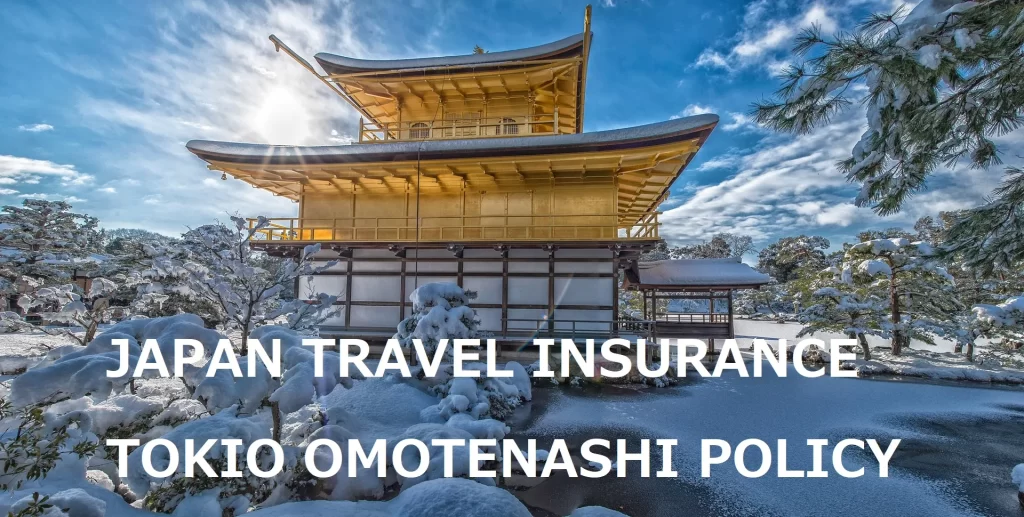
What is TOKIO OMOTENASHI POLICY?
TOKIO OMOTENASHI POLICY is an overseas insurance policy in case of sudden illness or injury for foreigners visiting Japan and or Japanese national’s returning to Japan temporarily for up to 31 days that can be purchased online. (Insurance can be purchased online).
If you need to see a doctor or hospital care is necessary the insurance company should be contacted and your medical expenses will be paid directly from the insurance company to your caregiver. (Cashless)
TOKIO OMOTENASHI POLICY is easy and reasonably priced because it is specialized for illness and injury, the premium is less expensive than general overseas travel insurance. (Easy and Reasonable). In addition by using the dedicated application, you will be able to use support functions for certain troubles and natural disasters that might occur during your stay in Japan.
( You can easily contact the insurance company via the app)
Click for Apprication ↓↓↓↓↓↓↓↓↓

For example, if something like this happens…
Sudden illness… Prepare for sudden illness during your stay in Japan.
Unlike your everyday life, the environment and food changes when you travel may or may not have an effect on your health.
Even if you are a foreign national that is accustomed to eating Japanese food and enjoy eating other local dishes or unusual foods that you have never seen before. It could be a difference in temperature or many other things that may affect your health.
We are no longer in a era where we can say, “That will never happen to me so I’m fine”
We are also prepared for the new type of Coronavirus (Covid-19)

Unexpected injury… You were supposed to be enjoying yourself…

Covers injuries that occur during sports such as skiing
Traveling is a fun time, but injuries that occur during such times are common occurrences.
But, you also need to be careful about injuries that may occur during sports such as skiing.
Injuries that occur during these times are normal, but you should also be careful about injuries that occur during sports such as skiing.
Injuries may also occur during normal, everyday life. We provide coverage for injuries caused by sudden, accidental, and outpatient accidents.
Expensive medical bills… No way Why me …
In some cases, hospitals won’t accept medical examinations…
Foreign travelers and others who do not have health insurance. (100% self-payment).
There are cases where you will be charged an outrageous amount of money… It is very common.
Credit cards are not accepted at hospitals… you have to pay in cash.
Even medium-sized hospitals such as municipal hospitals and city hospitals do not accept credit card payments.
Also smaller clinics are known not to accept credit card payments.
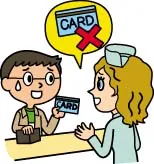
The insurance company will pay directly to the hospital or pharmacy
By contacting us before you go to the hospital, we contact the hospital first. We will contact the hospital before you go to the hospital so that you can concentrate on your treatment.
Please be aware that foreign visitors who fail to pay their medical expenses may be denied entry into Japan in the future. Japan National Tourism Organization (JNTO)
Non-payment of medical treatment by foreign travelers in Japan has become a problem, and the government has taken such measures.
Of course, Japanese nationals are no exception.

Incidental Services
The following services are also included in the package…

Lost or stolen passport or credit card…
Traveling is always fraught with problems, but there are some things you should never lose. (Available in a variety of languages)
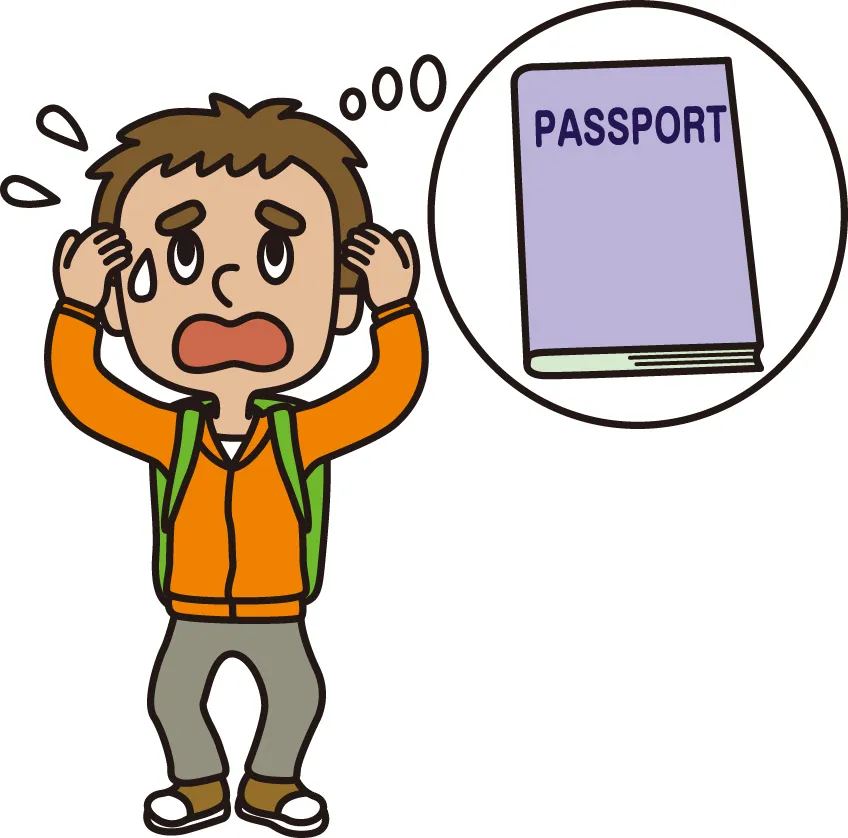
Internet connection lost…
We provide information on useful apps for using public Wi-Fi provided at tourist spots. We provide information on useful applications (with free Wi-Fi functionality for an unlimited period of time)
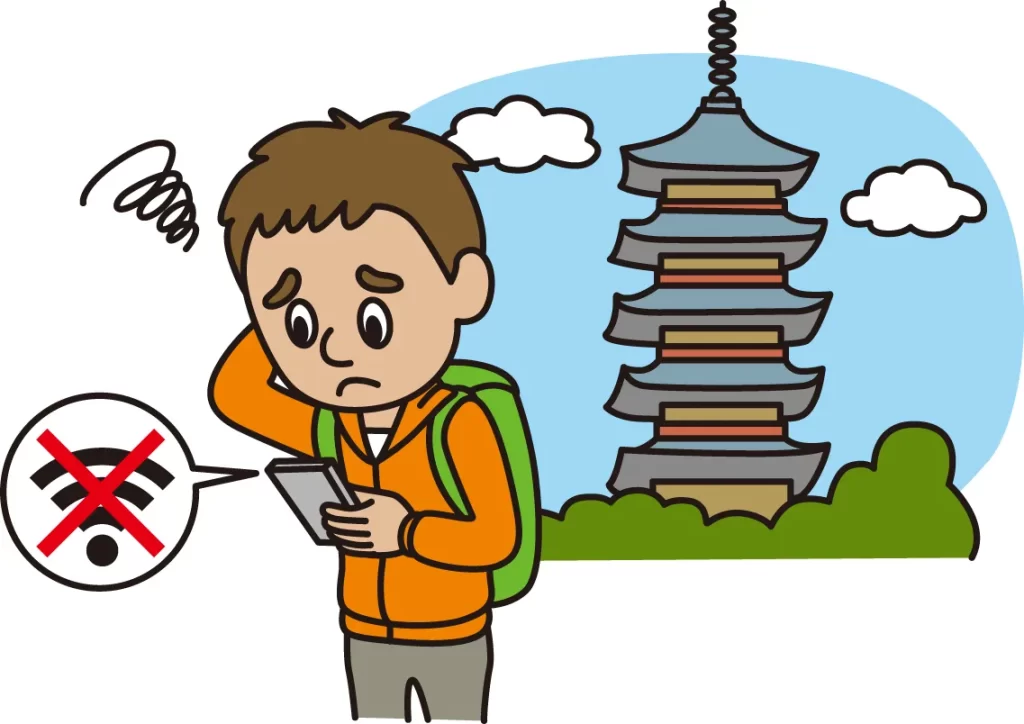
Insurance Amounts
Coverage item: medical treatment and transportation expense coverage (for foreign visitors to japan).
Covers medical treatment expenses for sudden illness or injury.
If you contact the insurance company before going to the hospital, the insurance company will pay the treatment expenses directly to the hospital. (To contact the insurance company, you need to install the application.)
10,000,000 yen (including covid-19 infection)
Rest assured that 100% of your expenses for medical treatment, medicine, hospitalization, surgery, and medical transportation to your home country will be covered up to 10 million yen.
Insurance Premiums
Insurance premiums vary depending on the period of insurance.
Please check
There are some important points to note.
About the insurance period
The insurance period is from the day after the date of application or the day of entry into Japan , whichever is later, to the day of completion of departure procedures from Japan.
Example: ① If you apply after entering Japan and apply today, set tomorrow as the insurance start date.
Example: ②Even if someone in Japan applies, depending on the country of departure, someone arriving tomorrow or later may not be able to apply.
(Please apply after entering Japan)
If you are staying in Japan for more than 32 days. (You need someone living in Japan. You can not buy Insurance by yourself) >> Click Here <<
What if it happens outside of Japan?
This insurance policy covers medical and pharmaceutical costs arising from injuries or illnesses occurring in Japan, as well as the cost of repatriation of the patient to his/her home country.
(Accidents outside of Japan are not covered.)
The required documents
Since enrollment is completed online, there are no documents required.
However, please be aware that you may not be able to use the insurance if you make a false declaration.
Common example: An application was submitted more than 5 days after entry to Japan, but an error occurred, so an incorrect date of entry was entered and insurance was purchased. 【The insurance cannot be used】
Can I apply from abroad?
The application site can only be accessed from within Japan, Hong Kong, China, or Korea.
How can I confirm the operation of the screen before I leave Japan? >> Click Here <<
↓↓↓ Click the banner to apply ↓↓↓↓

<Recommended Environment>
PC Microsoft Windows 7, 8, 8.1: Internet explorer 11.0 or higher, latest version of chrome Microsoft Windows 10 : Internet explorer 11.0 or higher, Microsoft Edge , the latest version of chrome
Smartphones and tablets Android 4.4 or later: Latest version of chrome iOS 8.4 or later: Latest version of safari
Please note that there are some cases where Firefox cannot be used.
For those who cannot proceed to the TOKIO OMOTENASHI POLICY application page >> Check this page <<
If you have any questions, please contact us by e-mail. mail: [email protected]
Underwriting Insurer Tokio Marine & Nichido Fire Insurance Co.
Handling agency OFFICE21 Co., Ltd.

This homepage provides an overview of the insurance policy. Please be sure to read the “Explanation of Important Matters” carefully before you make a contract. If you have any questions, please contact our agent.
/images/2018/01/23/navina-side-hustle-mid_MPfEDfV.jpg)
Best Credit Cards for Japan Travel [2024]: Enhance Your Trip
/authors/ben_walker_updated.png)
This article was subjected to a comprehensive fact-checking process. Our professional fact-checkers verify article information against primary sources, reputable publishers, and experts in the field.
/images/2024/01/18/woman-traveling-japan.jpeg)
We receive compensation from the products and services mentioned in this story, but the opinions are the author's own. Compensation may impact where offers appear. We have not included all available products or offers. Learn more about how we make money and our editorial policies .
For stress-free earning and valuable rewards to help cover a Japan trip, we recommend a card with a simple rewards rate like the Wells Fargo Autograph℠ Card or Capital One Venture Rewards Credit Card.
If you want to take advantage of multiple perks and benefits to enhance your travel experience, consider the Chase Sapphire Preferred ® Card and The Platinum Card ® from American Express.
Let’s explore the best credit cards for Japan travel to see which one is the best fit for you.
Key takeaways
The 7 best credit cards for japan travel, compare the best credit cards for japan travel, how to choose the best credit card for traveling in japan, best credit cards for japan travel: bottom line, methodology.
- The best travel credit card for Japan depends on your spending habits and travel preferences. We find that it’s hard to go wrong with a low-stress no-annual-fee card that earns valuable rewards. But cards with annual fees tend to have more benefits, which could include premium perks for traveling like airport lounge access.
- The Wells Fargo Autograph has a $0 annual fee and provides elevated rewards in multiple everyday categories. You can earn unlimited 3X points on restaurants, travel, gas stations, transit, popular streaming services, and phone plans; plus earn 1X points on other purchases.
- The Capital One Venture Rewards has a $95 annual fee and provides a no-hassle rewards rate for earning miles. You can earn 2 miles per dollar on every purchase, every day, 5 miles per dollar on hotels, vacation rentals and rental cars booked through Capital One Travel and 5 miles per dollar on Capital One Entertainment purchases through 12/31/25.
- The Chase Sapphire Preferred has a $95 annual fee and makes it easy to get more value from your travel redemptions. Cardholders receive a 25% bonus for travel redemptions made through Chase Travel℠.
- The Platinum Card from American Express has a $ 695 annual fee and provides some of the most extensive airport lounge access available as well as loads of other premium travel benefits (select benefits require enrollment).
Wells Fargo Autograph℠ Card
Bilt mastercard ®, bank of america ® travel rewards credit card, chase sapphire preferred ® card, capital one venture rewards credit card, citi strata premier℠ card, the platinum card ® from american express.
- $0 annual fee
- No foreign transaction fees
- No premium travel benefits
The Wells Fargo Autograph is an excellent option for earning travel rewards on everyday purchases.
Why we like Wells Fargo Autograph
It has a $0 annual fee, and you can earn unlimited 3X points on restaurants, travel, gas stations, transit, popular streaming services, and phone plans; plus earn 1X points on other purchases.
This type of earning rate makes it easy to rack up points on purchases you were already planning on making, such as buying gas or eating out.
In addition, you don’t have to worry about paying foreign transaction fees in other countries. And you can take advantage of flexible redemption options. This includes transfers to Wells Fargo travel partners .
What we don’t like about Wells Fargo Autograph
It doesn’t have any premium travel benefits, such as airport lounge access or an annual travel credit.
Read our Wells Fargo Autograph Card review for more details.
- Transfer partners
- Must use the card five times per statement period to earn points
The Bilt Mastercard makes it easy to earn rewards on rent and everyday purchases.
Why we like Bilt Mastercard
It has a $0 annual fee and you can earn 3X points on dining, 2X points on travel, up to 1X points on rent payments without the transaction fee (up to 100,000 points each calendar year), and 1X points on other purchases; must use the card 5 times each statement period to earn points.
The Bilt Mastercard is an amazing option for renters because it can help you earn rewards on rent without paying a transaction fee. You also don’t have to pay foreign transaction fees on applicable purchases.
Even better, you can transfer any points you earn to travel partners, including American Airlines AAdvantage and World of Hyatt. These are generally more unique transfer partners that can provide valuable redemption options for Japan travel.
For example, you can use AAdvantage miles to book one-way or roundtrip flights to Japan with Japan Airlines (JAL). And you can use Hyatt points to book award nights at Hyatt properties in multiple Japanese cities, including Tokyo, Kyoto, and Fukuoka.
What we don’t like about Bilt Mastercard
You won’t earn any points if you don’t use your card at least five times each statement period. Fortunately, any type of eligible transaction, even if it’s small, should count toward the five transactions.
Read our Bilt Mastercard review for more details.
- Simple rewards rate
The Bank of America Travel Rewards provides a simple way to earn travel rewards on all eligible purchases.
Why we like Bank of America Travel Rewards
It has a $0 annual fee, and you can earn 1.5 points per $1 spent on all purchases. With this type of rewards rate, you don’t have to worry about bonus categories. You can carry a single card in your wallet rather than multiple ones.
In addition, the Bank of America Travel Rewards doesn’t charge foreign transaction fees.
What we don’t like about Bank of America Travel Rewards
You can’t take advantage of premium travel benefits like airport lounge access or any type of travel-related credit.
Read our Bank of America Travel Rewards review for more details.
- 25% travel redemption bonus through Chase Travel℠
- Up to $50 in statement credits each anniversary year for hotel stays purchased through Chase Travel℠
- $95 annual fee
The Chase Sapphire Preferred provides loads of useful travel benefits for visiting Japan as well as other countries.
Why we like Chase Sapphire Preferred
With the Sapphire Preferred, you have no foreign transaction fees. You can earn 5X points on travel purchased through Chase Travel℠; 3X points on dining, select streaming services, and online groceries; 2X points on all other travel purchases, and 1X points on all other purchases.
If you want to use points to travel to Japan, you can redeem them through Chase Travel℠ for a 25% bonus. That means 10,000 points would be worth $125 toward travel.
You can also transfer points to travel partner loyalty programs, including United MileagePlus, Singapore Airlines KrisFlyer, and Virgin Atlantic Flying Club.
As an added bonus, cardholders can enjoy up to $50 in statement credits each account anniversary for any hotel stays purchased through Chase Travel℠. That’s an easy way to quickly discount some of your lodging.
What we don’t like about Chase Sapphire Preferred
This credit card doesn’t have many downsides. But you have to pay a $95 annual fee as a cardmember.
Read our Chase Sapphire Preferred review for more details.
- Up to a $120 credit for Global Entry or TSA PreCheck® every four years
The Capital One Venture Rewards provides a super simple way to earn valuable travel rewards on eligible purchases.
Why we like Capital One Venture Rewards
The Venture Rewards has no foreign transaction fees and you can earn 2 miles per dollar on every purchase, every day, 5 miles per dollar on hotels, vacation rentals and rental cars booked through Capital One Travel and 5 miles per dollar on Capital One Entertainment purchases through 12/31/25.
This type of earning rate makes it easy to earn elevated rewards on all eligible purchases rather than relying on specific bonus categories.
In addition, the Venture Rewards provides these travel benefits.
- Up to a $120 credit for Global Entry or TSA PreCheck®
- Transfers to travel partners, such as British Airways, Choice Hotels, and Cathay Pacific (Asia Miles)
What we don’t like about Capital One Venture Rewards
Cardholders have to pay a $95 annual fee.
Read our Capital One Venture Rewards Card review for more details.
- $100 off a single hotel stay of $500 or more through CitiTravel.com
The Citi Strata Premier provides access to valuable transfer partners and elevated earning potential for everyday spending categories.
Why we like Citi Strata Premier
You don’t have to pay foreign transaction fees, and you can earn 10X points on hotels, car rentals, and attractions booked on CitiTravel.com; 3X points on air travel and other hotel purchases, at restaurants, supermarkets, gas and EV charging stations; and 1X points on all other purchases. Not many cards offer that much earning potential on everyday purchases.
The Citi Strata Premier also has a unique benefit of providing $100 off a single hotel stay of $500 or more (excluding taxes and fees) through CitiTravel.com once each calendar year. If you’re planning on staying at one hotel for a few nights or more in Japan, this benefit could come in handy.
You can redeem your points for travel at thankyou.com or transfer them to travel partners, including Cathay Pacific, Choice Privileges, and EVA Air.
What we don’t like about Citi Strata Premier
You have to pay a $95 annual fee each year as a cardmember.
Read our Citi Strata Premier Card review for more details.
- Loads of credits and travel benefits
- Complimentary access to over 1,400 airport lounges
- (Select benefits require enrollment)
- $ 695 annual fee (terms apply)
The Amex Platinum makes sense if you want a luxury travel card with premium benefits.
Why we like The Platinum Card from American Express
It doesn’t have foreign transaction fees. Additionally, you can earn 5X points per dollar spent on eligible airfare (on up to $500,000 per calendar year, after that 1X) and eligible hotel purchases, and 1X points per dollar on all other eligible purchases.
The Amex Platinum also provides plenty of travel benefits and perks. Some valuable benefits for travel to Japan include:
- Complimentary access to over 1,400 airport lounges, including Centurion and Priority Pass lounges.
- Up to $200 airline fee credit per calendar year.
- Up to $199 CLEAR Plus credit per calendar year.
- Up to $120 Global Entry credit every four years or up to $85 TSA PreCheck® credit every 4.5 years (5-year plan only).
Keep in mind that select benefits require enrollment.
You can redeem your Amex Membership Rewards points for travel through amextravel.com or transfer your points to partners like ANA Mileage Club, Air Canada Aeroplan, and Delta SkyMiles.
What we don’t like about The Platinum Card from American Express
Cardholders pay a high $ 695 annual fee.
Read our American Express Platinum review for more details.
Consider these factors to help you find the best credit card for you if you want to travel to Japan.
The best travel credit cards have rewards programs that offer points or bonus miles for making eligible purchases. Many cards will also provide a welcome bonus or sign-up bonus that new card members can earn within a few months of account opening.
Cash back credit cards can also be used to help cover travel expenses, but they typically lack travel benefits.
Depending on your spending habits, you might want a card with a simple rewards rate or one that has bonus categories.
A simple rewards rate makes it easy to earn elevated rewards on all purchases, regardless of the category. A card with bonus categories provides additional rewards on specific types of purchases, such as gas, travel, or groceries.
2. Redemption options
If you want to travel to Japan, you likely want a card with travel redemption options. That could include:
- Travel portal redemptions: Redeem rewards with a travel portal for flights, hotel stays, rental cars, and experiences.
- Transfer partner redemptions: Transfer points to a hotel or airline travel partner where you plan to use points for a flight or hotel stay.
Cards with multiple travel-related redemption options are considered more flexible.
3. Perks and benefits
Travel benefits can come in all shapes and sizes, but here are a few to look for.
- Airport lounge access: If you’re going to Japan, there’s definitely an airport involved. Having airport lounge access can make all the difference in enhancing your airport experience.
- Trusted traveler membership credit: Being a TSA PreCheck®, Global Entry, or CLEAR Plus member is considered essential for frequent travelers. But these memberships can also make sense for occasional travelers who want to avoid some of the hassles of airport screening processes.
- Travel credit: Different travel cards have different types of travel credit. We prefer a credit that covers any eligible travel purchase because of the flexibility. But other types of credits can also easily be used.
- Travel insurance: Many card issuers work with different providers to offer credit card travel insurance. This could include trip delay reimbursement, lost luggage coverage, car rental insurance, and more.
4. Foreign transaction fees
Major credit cards are widely accepted in Japan, so be sure to carry a Visa or Mastercard (or both) in your wallet. As an added measure, make sure your credit card doesn’t charge foreign transaction fees.
Paying around 3% extra for every credit card transaction may seem small, but it can add up quickly as you make more purchases.
5. Annual fee
Credit cards with annual fees tend to have more benefits to justify the cost. So you have to determine whether you’ll get enough use from a card’s benefits to offset the annual fee.
If you don’t think you will, consider applying for a no-annual-fee credit card .
6. Credit requirements
You typically need a good or excellent credit score to qualify for top travel credit cards. But you’ll discover that most card issuers consider more factors beyond your credit score. These could include your total debt, annual income, past credit history, and more.

Is it easy to pay with a credit card in Japan?
Japan is a cash-heavy society, but major credit cards are still accepted in larger cities, stores, and restaurants. If you plan to travel off the beaten path or visit a smaller establishment, it makes sense to have some local currency on hand to make necessary purchases.
Can I withdraw cash from my credit card while traveling in Japan?
Yes, but it’s not a good idea because credit card companies typically charge cash advance fees for cash withdrawals. A better option is to use a debit card with no international ATM fees for a quick way to get some local cash.
Should I buy yen before going on a trip to Japan?
It’s not necessary to have yen before arriving in Japan, but it could make sense to purchase some beforehand if there’s a favorable exchange rate. However, major credit card networks like Visa and Mastercard are commonly accepted throughout the country. Just make sure you have a credit card with no foreign transaction fees .
We recommend different cards for Japan travel depending on your spending habits, travel preferences, and personal finance goals.
If you want cards with simple rewards rates, consider the Bank of America Travel Rewards and Capital One Venture Rewards. For cards with increased travel benefits, consider the Chase Sapphire Preferred and Amex Platinum cards.
For more of our top recommendations, compare credit cards to find the right card offer for you.
To identify the best credit card for Japan travel, we considered various credit cards based on their rewards, benefits, and perks for travel purchases or other related expenses abroad (including in Japan, of course).
We also considered factors such as foreign transaction fees, annual fees, and acceptance when using each card abroad. We selected a range of credit cards that cater to different needs and preferences, but keep in mind that our list doesn’t include all available options and isn’t ranked in any specific order. Our goal is to provide a variety of options that can help travelers to Japan research their options and find ways to earn rewards on their travel expenses.
Easy-to-Earn Unlimited Rewards
Card Details
- Simple, flat-rate rewards
- Flexible redemption options
- Up to 75% preferred Rewards bonus potential
- Earn unlimited 1.5 points per $1 spent on all purchases, with no annual fee and no foreign transaction fees and your points don't expire as long as your account remains open.
- 25,000 online bonus points after you make at least $1,000 in purchases in the first 90 days of account opening - that can be a $250 statement credit toward travel purchases.
- Use your card to book your trip how and where you want - you're not limited to specific websites with blackout dates or restrictions.
- Redeem points for a statement credit to pay for travel or dining purchases, such as flights, hotel stays, car and vacation rentals, baggage fees, and also at restaurants including takeout.
- 0% Intro APR for 15 billing cycles for purchases, and for any balance transfers made in the first 60 days. After the Intro APR offer ends, a Variable APR that’s currently 18.74% - 28.74% will apply. A 3% Intro balance transfer fee will apply for the first 60 days your account is open. After the Intro balance transfer fee offer ends, the fee for future balance transfers is 4%.
- If you're a Bank of America Preferred Rewards® member, you can earn 25%-75% more points on every purchase. That means instead of earning an unlimited 1.5 points for every $1, you could earn 1.87-2.62 points for every $1 you spend on purchases.
- Contactless Cards - The security of a chip card, with the convenience of a tap.
- This online only offer may not be available if you leave this page or if you visit a Bank of America financial center. You can take advantage of this offer when you apply now.
/images/2023/08/22/boa-travel-rewards-credit-card.png)
FinanceBuzz writers and editors score cards based on a number of objective features as well as our expert editorial assessment. Our partners do not influence how we rate products.
on Bank of America’s secure website
Intro Offer
Earn 25,000 online bonus points after you make at least $1,000 in purchases in the first 90 days of account opening - that can be a $250 statement credit toward travel purchases
Why we like it
The Bank of America ® Travel Rewards credit card is great for individuals who enjoy earning rewards and traveling.
Cardholders will enjoy the flexibility to redeem points with no blackout dates and receive a statement credit to pay for travel and dining purchases.
Earn 1.5X points on all purchases everywhere, every time.
Author Details
/authors/ben_walker_updated.png)
The Ultimate Guide to the Best Credit Cards in Japan for Foreigners: 2024 Edition
- We may earn a commission from affiliate links
Navigating the vast world of credit cards in Japan can be a daunting task, especially for foreigners new to the country’s unique financial system. With the variety of options available, including prepaid cards and gold cards, it’s crucial to find a credit card that complements your lifestyle, spending habits, and the length of your stay in Japan. This guide is meticulously designed to take you on a journey through the essentials of selecting and using credit cards in Japan as a foreigner, tailored to your specific needs in 2024.
Living in Japan as a foreigner can bring forth a blend of exhilarating cultural experiences and logistical challenges—one of which is managing your finances effectively. In a country where cash has long been king, the growing acceptance of credit cards and the benefits they bring are too advantageous to ignore. Whether it’s for handling daily transactions, online shopping, or securing an emergency line of credit, owning a credit card in Japan can significantly ease your financial dealings.
However, foreigners often find that applying for and choosing the right credit card isn’t exactly straightforward. With language barriers and stringent application criteria, the process can seem overwhelming. This guide aims to demystify the essentials, presenting an informed path for you to secure the best credit cards available in Japan for foreigners. From exploring eligibility to maximizing benefits—we’ve got you covered.
Let’s dive deeper into the unique credit card ecosystem of Japan and understand how to leverage it to your advantage.
Understanding the Credit Card System in Japan for Foreigners
Navigating the financial waters of a new country can be perplexing, and Japan is no exception, especially when it comes to credit cards. This segment will shed light on the intricacies of the Japanese credit card system and why it’s beneficial for foreigners to integrate this tool into their financial arsenal while living in Japan.
Key Differences Between Credit Cards in Japan and Abroad
Japanese credit cards often come with features that differ from what you might be used to. For starters, many offer a “revolving” payment option, which allows you to pay off your balance in flexible installments, with interest. This is distinct from the fixed monthly payment system that’s common in many Western countries.
Another standout aspect is the security technology employed. In Japan, credit cards with integrated circuit (IC) chips are the norm. These chips, coupled with personal identification numbers (PIN), provide an added layer of protection against fraud, a departure from the magnetic-strip cards still in circulation elsewhere.
It’s also worth noting that some Japanese credit cards are not as widely accepted internationally. Brands like JCB are ubiquitous in Japan but may not be as readily accepted abroad. This could influence your decision if you frequently travel or make international purchases.
Why Foreigners Need a Credit Card in Japan
The advantages of having a credit card in Japan are manifold. Firstly, convenience reigns supreme. Japan is steadily moving away from its cash-centric ways, and having one of the best credit cards, like a Marui card, on hand can streamline daily transactions. This is particularly true in cities, where contactless payments are on the rise.
A credit card is also a boon in emergencies. Should you face unforeseen expenses, a credit card provides a critical financial safety net. Plus, for foreigners looking to establish roots in Japan, using a credit card responsibly helps to build a credit history —key if you plan to apply for loans or enter into contracts for phones or apartments.
Common Credit Card Terms in Japan Explained
Familiarizing yourself with common terminology is a foundational step towards mastering the credit card game in Japan. Terms like “Rakuten Card” , associated with Japan’s largest e-commerce platform, indicate a card that’s optimized for online shopping with generous reward schemes.
The “EPOS Card” speaks to versatility—often available with no annual fees and with benefits at various retailers. “JCB Card which can be easily compared with Mastercard or a Gold Card.” is a homegrown brand with a strong presence in Japan, recognized for its exceptional service and partnerships that offer in-store discounts.
Knowing these terms and their associated benefits is the compass you’ll need to navigate Japan’s credit card terrain.
As we sail further into this financial journey, the next leg of our voyage involves understanding what it takes to qualify for a credit card and the procedural steps to obtaining one in Japan. Let’s uncover the eligibility requirements and essential documentation that pave the way towards credit card ownership for foreigners in the Land of the Rising Sun.
Eligibility and Application Process for Foreigners
Before you can enjoy the convenience and rewards offered by Japanese credit cards, you must first navigate the application process—a task that can be shrouded in mystery and bureaucratic intricacies. Let’s demystify the eligibility criteria and required documentation to set you on the path to approval.
Eligibility Criteria for Credit Card Application in Japan
The eligibility criteria for obtaining a credit card in Japan are quite stringent, particularly for foreigners. Applicants are generally expected to have:
- Residency in Japan : Most credit card companies require applicants to have medium to long-term residency status. This is often verified through your residence card, which you’ll need to show as part of your application.
- Stable Income : Evidence of a steady income reassures issuers of your ability to repay. This usually means you’ll need to be employed or possess a solid track record of income if self-employed.
- A Japanese Bank Account : Having a bank account in Japan is usually a prerequisite and is also where your credit card bills will be paid from.
- A Phone Number is required when you want to apply online for a credit card in Japan. : You’ll need to be reachable, so a Japanese phone number is another common requirement.
- Age : Most credit card companies set an age limit of 20 years or older for applicants.
Moreover, credit card companies may also conduct a credit check to verify if you have a history of responsible credit usage.
Documentation Required for Credit Card Application
Gather your documents thoughtfully, as incomplete or incorrect documentation can lead to immediate rejection. Typically, you will need:
- Residence card (在留カード, zairyū kādo): To confirm your visa status and period of stay.
- Personal Identification : This can be your passport or driver’s license if you have one in Japan.
- Proof of Income : Such as salary slips or a tax certificate if you’re self-employed.
- Japanese Bank Account Details : Including bank statements and your bank book (通帳, tsūchō).
- Phone Number and Email Address : To enable smooth communication regarding your application status.
Many credit card companies have adopted online applications—transforming the once onerous paperwork into a more streamlined process. Nevertheless, it pays to double-check the specifics for each issuer, as requirements might slightly vary.
Armed with the right information and preparedness, your voyage towards credit card acquisition in Japan should sail smoothly into the sunset. Keep these guidelines close to heart, and soon, you’ll be poised to reap the benefits that the best credit cards in Japan for foreigners have to offer.
Choosing the Best Credit Card for You
Identifying the most suitable credit card in Japan requires a careful evaluation of your personal spending habits and financial goals. Here’s how to navigate the sea of options and pinpoint a card that best suits your needs as a foreign resident or expatriate in the archipelago.
Factors to Consider When Selecting a Credit Card
When assessing credit cards, ponder over the following considerations:
- Annual Fees : Some cards charge yearly fees which could chip away at the benefits if you’re not using the card extensively. Weigh the perks against the cost to determine if it’s worthwhile.
- Reward Schemes : Whether you prefer cashback, travel miles, or point systems that can be exchanged for goods, there’s likely a card tailored to your liking.
- Interest Rates : Known as one of the easiest to apply for online, the Marui credit card is quite popular. 利息 (risoku) in Japanese, these rates come into play if you opt for revolving credit or miss a payment.
- Acceptance and Convenience of credit card like Mastercard, prepaid card and Marui in Japan. : How widely is the card accepted, both online and at physical establishments? Are there compatible ATMs nearby?
- International Use : If you travel often, look for a card that offers low foreign transaction fees and is accepted worldwide.
- Customer Support : Ensure support is available in a language you’re comfortable with, and consider the ease of online banking tools.
Understanding Interest Rates and Fees
Interest rates (年率, nenritsu) and fees in Japan can be unfamiliar territory for foreigners. Most cards offer a grace period where no interest is charged if the balance is paid in full. However, interest rates can be steep if you carry a balance— often around 15% or higher . Always ensure you understand the repayment terms to avoid getting caught in a high-interest debt trap.
Some common fees include:
- Late payment fees (遅延損害金, chien songaikin): Incurred when you miss a payment deadline.
- Cash advance fees (キャッシング利用手数料, kyasshingu riyō teshūryō): Charged when you withdraw cash from an ATM with your credit card.
- Over-limit fees (限度額超過手数料, gendo-gaku chōka teshūryō): Applied if you exceed your assigned credit limit, a factor to consider when choosing the easiest credit card to apply for in Japan.
Understanding the complete cost structure is crucial to smart credit card use.
Rewards and Benefits Comparison
To truly capitalize on the card benefits, a comparison of the reward structures is essential:
- Points Rewards : These can typically be converted into discounts, merchandise, or even airline miles. Rakuten Card , for example, is coupled with an extensive point system particularly advantageous for individuals who shop often on their platform.
- Cashback : Some cards offer a percentage of cash back on all purchases, which can add up if you’re placing considerable spend on the card.
- Travel Insurance : Frequent travelers might place a premium on cards that offer substantial travel coverage. This is usually complimentary but can vary widely in terms of scope and value.
- Sign-up Bonuses : Initial offers such as bonus points or waived fees can be appealing, but always read the fine print to understand the long-term value beyond the introductory period.
Analyze these details against your personal spending patterns to optimize the potential return on your credit card in Japan.
In discerning the optimal credit card, we’re not simply choosing between color and design—the true essence lies in matching its functionality with our lifestyle and financial management style. The next segment will take a magnified look at some of the best credit cards available in Japan for foreigners, which might just hold the key to your financial comfort and convenience in the land of the rising sun.
The Best Credit Cards in Japan for Foreigners
2024 brings a suite of credit card offerings for foreigners, including Mastercard and Marui, tailored to the unique needs of foreigners living in Japan. The easiest credit card to apply for one online. From the fantastic perks for avid shoppers to the exclusive rewards for globetrotters, these credit cards stand out for their features, acknowledge the foreign community, and offer advantages that can help you make the most of your time in Japan.
Rakuten Credit Card: The Smart Shopper’s Choice
The Rakuten Credit Card is a powerhouse for those who love to shop, particularly online. Integrated with one of Japan’s biggest e-commerce platforms, it offers an impressive rewards program where users accumulate points on every purchase, which can then be redeemed on Rakuten’s vast marketplace.
- No Annual Fee : It entices with zero yearly charges, adding to its appeal.
- Generous Rewards System : Users earn points not only on Rakuten but also when the card is used at various other outlets.
- Compatibility with Mobile Payments is an advantage of utilizing one of the best credit cards, such as Mastercard in Japan. : The card works seamlessly with Apple Pay and other mobile wallets.
- Travel Benefits : Comes with complimentary travel accident insurance when you use the card to book travel.
The Rakuten Credit Card is an excellent choice for those who love to shop and want to make every yen spent count.
Saison Credit Card: The Everyday Versatile Choice
When versatility is key, Saison Credit Cards impress with a range of options that cater to every kind of user. Known for their flexible credit limit and user-friendly payment options, these cards are designed to integrate seamlessly into your daily life.
- Permanent No Annual Fee : Selected Saison cards offer a no annual fee for life, reducing long-term costs.
- Cashback and Discounts : Enjoy cashback rewards and discounted offers at affiliated stores.
- Convenient Payment Options : Offers both full payment and installment options post-purchase.
- Credit Score Building : Good for those looking to build a credit history in Japan.
EPOS Credit Card: Versatile and Foreigner-Friendly
The EPOS Credit Card has carved a niche for itself with a simple application process and a foreigner-friendly approach. It offers an array of exclusive deals and discounts across various retail partners, making it a card worth considering for those who appreciate a broad range of benefits.
- No Annual Fee : EPOS also promotes a zero annual fee structure.
- Wide Range of Merchant Benefits : Cardholders, especially of Mastercard or Marui, have access to discounts and points at an extensive network of merchants in Japan.
- Easy Application : The card has a reputation for easier approval, which can be a boon for foreigners new to Japan.
American Express: The Mark of Premium Service
American Express Cards , often referred to as Amex, are synonymous with premium customer service and exclusive perks. Although they might come with an annual fee, the benefits can be substantial, making them a fitting choice for those who prefer luxury and high-quality service.
- International Perks : Amex is renowned for its travel perks, including access to airport lounges and comprehensive travel insurance coverage.
- Reward Programs : The Membership Rewards program allows you to earn points on every purchase that can be redeemed in various ways, including travel.
- Strong Customer Support : American Express boasts a dedicated multilingual support system that can be crucial for expatriates.
Amazon Card: Best for Frequent Amazon Shoppers
If Amazon is your go-to for shopping, the Amazon Card might just be your best financial companion in Japan. Tailored to reward frequent Amazon users:
- Cashback on Amazon Purchases : Get cashback for every purchase made on Amazon.
- Annual Fee Waivers : In many cases, the annual fee is waived for the first year or with a certain level of annual spend.
- Bonus Points : Earn bonus points on sign-up which can be used for further Amazon purchases.
JCB Card: Blending Tradition with Modernity
The JCB Card captures the essence of Japan, offering a blend of traditional values and modern benefits. JCB’s widespread local acceptance and growing international presence make it an attractive choice for many:
- Diverse Rewards and Benefits : From discounts at restaurants and shops to accumulating points for flights, JCB cards offer a competitive package.
- No Foreign Transaction Fees : For the international traveler, certain JCB cards offer the advantage of no fees on transactions made overseas.
- Cultural Initiatives : As a card that celebrates its Japanese roots, JCB often offers exclusive access to cultural experiences and events.
Each of these credit cards — from Mastercard to Marui — carries its own charm and practicality. It’s crucial to apply online and get one in Japan. As a foreigner in Japan, the best credit card for you is one that resonates with your spending habits and provides benefits that you’ll truly use. Do your due diligence and pick not just any card, but the right card to accompany you on your Japanese adventure.
Approaching the culmination of our guide, we will next walk through the application process for getting a credit card in the land of the rising sun and proffer advice on maximizing benefits once you have that card in hand.
Applying for a Credit Card as a Foreigner in Japan
The quest for a credit card in Japan can be both thrilling and taxing for foreigners. To turn this endeavor into a smooth sail, it’s essential to comprehend the application nuances and arm yourself with strategies for success.
Step-by-Step Guide to the Application Process
The process for applying for a credit card in Japan has been refined over the years, yet it still requires meticulous attention to detail. Here’s a step-by-step guide to keep you on track:
- Select Your Preferred Credit Card : Based on the factors previously discussed, choose a card that aligns with your lifestyle and financial goals.
- Prepare Your Documentation : Gather all necessary documentation, including your residence card, identification, income proof, and bank account information.
- Fill Out the Application Form : Whether online or in paper form, accurately complete the application. Every detail counts, from your name to your income declaration.
- Submit Your Application : With online applications increasingly available, submit your form electronically or visit a bank branch or card center to hand it in person.
- Wait for Approval : Credit card companies typically take one to two weeks to process an application. Some may offer instant approval, but this is less common for foreigners.
- Receive Your Card : Once approved, your credit card will be mailed to you, usually in a week or two.
Tips for a Successful Credit Card Application
- Establish a Local Credit History : Using local store credit and paying utility bills timely can demonstrate financial reliability.
- Ensure Accurate Translation : If your documentation requires translation, get it professionally done to prevent misunderstandings.
- Consider Applying In Person : While online applications are convenient, applying in person can offer the chance to address any potential questions directly.
- Have a Guarantor if Possible : Some credit card companies are more receptive to applications with a local guarantor.
- Know Your Japanese Credit Score : Similar to credit scores internationally, Japan has its credit scoring system. So, understanding where you stand can help gauge your likelihood of approval.
What to Do If Your Credit Card Application Is Denied
Rejection can be disheartening, but it’s not the end of the road:
- Request an Explanation : Understanding why your application was rejected can help you address the specific issues.
- Review Your Credit Report : Check for any errors or outstanding debts that may have influenced the decision.
- Improve Your Financial Standing : Work on boosting your income, saving more, or paying down existing debt.
- Re-apply at a Later Date : Sometimes, just waiting a while and establishing a longer residence period in Japan can make all the difference.
Online Application vs. In-Branch Application
Choosing between an online application or visiting a branch in-person hinges on several factors:
- Convenience vs. Immediate Assistance : Online applications are more convenient, but in-person applications offer the chance to get immediate help with questions or concerns.
- Language Barriers : In-person applications may provide access to English-speaking staff, which could be invaluable for some applicants.
Application submission is a pivotal step in your credit card journey, and careful preparation can greatly enhance your success rate.
Now that you’re familiar with the application process, it’s time to turn our attention to the next chapter—managing your credit card wisely and reaping the benefits post-approval.
Post-Application: Using Your Credit Card in Japan
Once you’ve successfully navigated the application seas and your shiny new credit card has arrived, it’s time to anchor down and master the art of responsible usage. Understanding your statement and maximizing your card’s benefits, such as those of a Mastercard, can help you enhance your financial life in Japan.
Understanding Your Credit Card Statement
Your monthly credit card statement is a summary of your financial activities pertaining to your card, and in Japan, it’s no less comprehensive. Here are some key sections:
- Billing Period (請求期間, seikyū kikan): The time frame for the transactions included in the statement.
- Payment Due Date (支払い期限, shiharai kigen): The date by which you must make your payment to avoid late fees.
- Minimum Payment Due (最低支払金額, saitei shiharai kingaku): The least amount you can pay to keep your account in good standing.
- Reward Points (ポイント, pointo): The number of points you’ve accumulated, which can be redeemable for various rewards.
To ensure you’re not caught off-guard by any charges, scrutinize each transaction, look out for any unfamiliar ones that might suggest fraudulent activity, and ensure you understand the rewards and fee structure. Most companies now provide online banking platforms that allow you to monitor your account and statements digitally, which makes keeping track even more convenient.
How to Maximize Your Credit Card Benefits
To truly benefit from your credit card, you need to use it strategically:
- Pay in Full : Whenever possible, clear your balance in full to avoid interest charges and maintain a healthy credit score.
- Leverage Reward Programs : Engage in activities that rack up points or cashback. If your card rewards dining, consider using it for restaurant bills; if it’s travel-focused, book your flights with it.
- Understand Promotional Offers : Many cards come with sign-up bonuses or promotional periods offering additional points or cashback. Stay aware of these offers and capitalize on them.
- Utilize Additional Perks : Some cards come with complementary insurance, concierge services, or access to airport lounges – make sure you’re not leaving any perks on the table.
Being cognizant of how you use your credit card not only helps avoid debt but can earn you a wealth of benefits that could save you money and enhance your lifestyle in Japan.
Challenges and Solutions for Foreigners Using Credit Cards in Japan
Navigating language barriers.
Language can be a significant hurdle when dealing with financial products in Japan. Fortunately, many credit card companies now offer assistance in multiple languages, and there are plenty of online tools and services that translate and explain your statements in English or other languages. Don’t hesitate to reach out for help if needed.
Dealing with Fraud and Security Concerns
Credit card fraud is a global issue, and Japan is not impervious. To safeguard yourself:
- Monitor Your Account : Regularly check your statement and online account for unexpected charges.
- Secure Your Card and Information : Be vigilant about where and how you share your credit card details, especially online.
- Act Quickly : If you suspect any fraudulent activity, contact your credit card issuer immediately to dispute unauthorized charges and secure your account.
Japan’s move towards a more cashless society can be a boon for the foreign community, adding layers of convenience, security, and benefits. By fully understanding and maximizing credit card benefits, your financial journey in Japan will be more rewarding.
Credit Cards vs. Debit Cards: Making the Right Choice
Deciding between a credit or debit card comes down to weighing the benefits against your personal financial situation. Credit cards are superior regarding rewards and protection but require disciplined spending to avoid debt. Debit cards offer less risk of accumulating debt and may be better suited for those looking to strictly manage their spending.
By thoroughly understanding your spending habits and the financial tools at your disposal, you can decide which card best matches your lifestyle.
As our guide draws towards its end, let’s reflect on the best financial practices for foreigners living in Japan and review additional resources for future reference and assistance.
Final Thoughts and Resources
Embarking on a financial journey in Japan entails much more than merely obtaining a credit card. It requires an ongoing commitment to understanding the local financial system and leveraging available resources to make informed decisions.
Preparing for Future Financial Needs in Japan
As a foreigner in Japan, it’s wise to consider your long-term financial health. Here are a few strategies to adopt:
- Regular Savings when using prepaid cards or efficient credit cards like Mastercard in Japan. : Create a habit of saving a portion of your income regularly to build a cushion for unexpected expenses.
- Investments : Explore investment options that align with your risk tolerance and financial goals, such as mutual funds, stocks, or even Japanese government bonds.
- Retirement Planning : Consider contributing to a Japanese pension scheme or an international retirement plan to ensure financial stability in your golden years.
- Tax Considerations : Familiarize yourself with Japan’s tax system to efficiently manage your finances and benefit from potential tax deductions.
Additional Resources and Help Centers
Knowledge is power, and there’s an abundance of resources available to help you make the most of your financial life in Japan:
- Consumer Finance Association Japan (CFAJ) : Provides guidance on responsible credit card use and financial management.
- Japan Financial Services Association (JFSA) : Offers information and resources on various financial services available in Japan.
- Credit Card Hotlines : Most card companies operate customer support lines where you can ask questions and get assistance.
- Expat Forums and Financial Blogs : Leverage the shared experiences and advice from fellow expatriates who have navigated the same waters.
With these strategies and resources, you’re better equipped to face any financial challenges that may arise during your stay in Japan. Maintaining a proactive approach to your finances can ensure not only a comfortable present but also a secure future.
Navigating the intricate ocean of credit cards in Japan can be a daunting task for foreigners. Yet, with the right guidance and information, it can transform into an empowering journey toward financial flexibility and rewards.
From understanding the credit card system to choosing the best card and maximizing its benefits, we’re confident that this comprehensive guide will serve as your navigational chart to financial fluency in Japan.
Lastly, beyond selecting a credit card, remember that your financial well-being in Japan is a voyage, not a sprint. Cultivate financial prudence, stay informed with the latest trends, and utilize the wealth of resources at your disposal.
You’ve reached the end of our Ultimate Guide to the Best Credit Cards in Japan for Foreigners: 2024 Edition, but the journey doesn’t end here. I encourage you to:
- Review the credit card options discussed and select the one that best fits your unique lifestyle in Japan.
- Take the next step by applying for your chosen card using the insights and tips provided here.
- And don’t forget to subscribe to our blog for more up-to-date financial guides and tips tailored to life in Japan.
Whether you’re a student, a professional, or simply enjoying Japan’s rich culture, the right credit card can make all the difference. Now go forth – choose wisely, spend responsibly, and revel in the experiences that await you in this vibrant country.
Remember, this blog post is just the starting point. Feel free to explore the details, compare specific cards, and ask further questions to make informed decisions about your finances in Japan. Good luck!
Frequently Asked Questions about Credit Cards for Foreigners in Japan (2024)
1. what are the biggest challenges foreigners face when applying for credit cards in japan.
Navigating language barriers, meeting strict eligibility criteria (like stable income and long-term residency), and understanding unique Japanese credit card features like revolving payments and IC chip technology can be challenging for foreigners. This guide provides clear explanations and resources to overcome these hurdles.
2. What are the most important factors to consider when choosing a credit card in Japan?
Your spending habits and financial goals should guide your choice. Consider annual fees, reward programs (cashback, points, travel miles), interest rates, acceptance (online and in-stores), international use, and customer support in your preferred language. This guide analyzes popular cards like Rakuten, Saison, EPOS, and JCB to help you find the perfect match.
3. How can I maximize the benefits of my credit card in Japan?
Pay your balance in full to avoid interest charges and earn rewards. Leverage specific card perks like bonus points on certain purchases, travel insurance, or exclusive discounts. This guide offers strategies to make the most of your card’s potential and save money.
4. What are the main differences between credit cards and debit cards in Japan?
Credit cards offer rewards, build credit history, and provide emergency spending power, but require responsible use to avoid debt. Debit cards directly deduct from your bank account, minimizing debt risk but offering fewer benefits. This guide helps you decide which option best suits your financial needs.
5. Where can I find additional resources and help with managing my finances in Japan?
The Consumer Finance Association Japan (CFAJ), Japan Financial Services Association (JFSA), credit card company hotlines, and expat forums offer valuable guidance. This guide includes links and recommendations to empower your financial journey in Japan.
Recommended Passes
Regions of japan, other posts.

Fukui: 12 Best things to do in Fukui Prefecture

Tottori: 12 Top-Rated things to do in Tottori

Shizuoka: 12 Best Things to do in Shizuoka

Nagano: 12 Top-Rated Things to do in Nagano
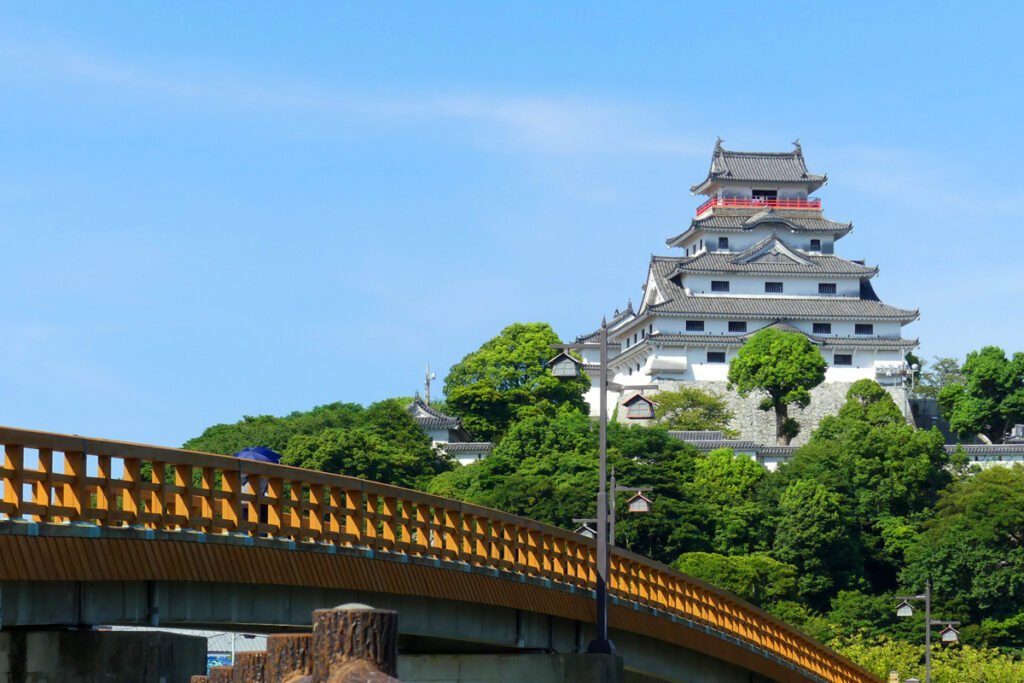
Saga: 12 Top-Rated Things to do in Saga

Kumamoto: 12 Top-Rated Things to do in Kumamoto

Ishikawa: 12 Top-Rated Things to do in Ishikawa

Oita: 12 Top-Rated Things to do in Oita

Wakayama: 12 Best things to do in Wakayama Prefecture

5 Best Travel Insurance for Japan – Requirements and Cost
Home | Travel | Asia | 5 Best Travel Insurance for Japan – Requirements and Cost
If Japan’s ancient temples and captivating landscapes are calling you, make sure you get Japanese travel insurance so you’re covered for any mishaps. You should visit this country at least once, but it’s also essential to plan for the unexpected. After all, anything can happen while traveling!
I’ll tell you upfront that travel insurance for Japan isn’t a requirement for entering the country. However, I consider it essential any time you take a trip. Besides, healthcare in Japan is super expensive, so it’s much better to pay for insurance beforehand rather than deal with huge medical bills in an emergency.
We’ve been using Heymondo for years now, and it’s proven to be one of the best travel insurance companies . It offers an excellent coverage-to-price ratio, and it’s one of the few providers that pays your medical expenses upfront , so you don’t have to pay out of pocket and file a reimbursement claim. You can use our Heymondo discount code for 5% off your policy.
5% OFF your travel insurance
Another great option if you’re traveling on a budget is SafetyWing . However, bear in mind that it has a $250 deductible per claim , and in case you need medical assistance, you will need to pay for it from your own pocket and then fill out a claim for reimbursement once you’re back home. I’ll share more about these and other travel health insurances for Japan below so you can find the perfect plan for your trip purpose and budget.
Guide to the best travel insurance for Japan
This article will cover everything you should know about travel health insurance for Japan , including:
Japanese travel insurance price comparison
Best travel insurance for japan, what does japanese travel insurance cover.
Tips for finding the best travel insurance for Japan
Do you need travel insurance for Japan?
No, travel insurance isn’t an entry requirement for Japan , but taking out a policy is always wise. This is especially true in a country like Japan, where medical services come with a steep price tag. While I hope you don’t have to deal with an accident or sickness during your trip, if you do, at least you’ll have the peace of mind of being covered by your Japanese travel insurance .
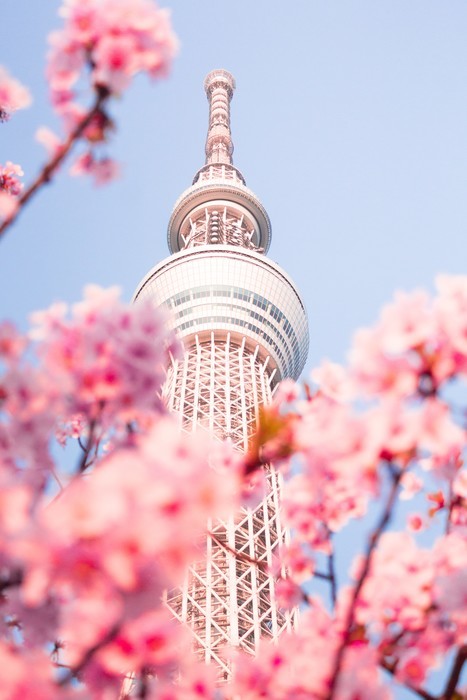
With travel medical insurance for Japan , you won’t have to worry about the expenses related to an injury or illness. Many policies also include benefits like trip interruption and baggage loss, but I’ll talk about that later .
Here is a chart that gives you a better idea of how much travel insurance to Japan costs . As you can see, the price ranges from around $1.50/day to $6/day. Of course, it’s also important to look at the coverage amounts and additional benefits before choosing a company.
For this comparison, I chose the best Japanese travel insurance plans from five top providers. I simulated the costs for a 30-year-old American traveling to Japan for two weeks with a trip cost of $2,500:
*Price used for example
This is just an example, but you’ll see that some insurance policies offer more coverage than others. Deciding which benefits you want is essential to choosing the best plan for you. Don’t worry; I’ll help you narrow down the options !
Let’s dive deeper into the best travel insurance for Japan . While we’ve been using Heymondo for years (and absolutely love it), I know everyone has different needs. For example, if you’re on a budget and primarily interested in medical-related protection, SafetyWing is an excellent choice.
Below, I’m sharing the five insurers that stand out in terms of pricing, coverage, and benefits.
- Heymondo , the best travel insurance for Japan
- SafetyWing , a cheap travel insurance for Japan
- IMG Global , a good Japanese travel insurance for seniors
- Travelex , a basic insurance for travel to Japan
- Trawick International , a great medical travel insurance for Japan
1. Heymondo , the best travel insurance for Japan
First, Heymondo is the best Japanese travel insurance for those looking for a high amount of medical coverage. With the Heymondo Top plan, you’ll have $250,000 in emergency medical coverage and $500,000 for evacuation and repatriation. There are also great trip-related benefits like baggage loss protection, travel disruption, and trip cancellation.

Unlike other insurers, Heymondo pays your medical bills upfront , so you don’t have to pay out of pocket and file a claim for reimbursement. Just use the 24/7 app to contact the customer support team, and they’ll tell you the nearest hospital or clinic to go to. By the time you arrive, they’ll have paid everything for you, so you can focus on getting better. The customer support app is also handy for quick questions or concerns, as you can chat with a doctor without going to a medical center.
Indeed, Heymondo isn’t the cheapest option. Still, it’s competitively priced and offers incredible protection for unforeseen health emergencies, which is crucial for a country like Japan, where medical care is expensive.
We’ve had to rely on our Heymondo insurance throughout the years, and the company has always taken great care of us. From lost luggage and flooded camera equipment to countless stomach problems, Heymondo has supported us through it all.
Now that we’re traveling full-time, we use their long-stay travel insurance and can confidently recommend it. If you choose this company, take advantage of our Heymondo discount below .
2. SafetyWing , a cheap travel insurance for Japan
SafetyWing is another worthwhile travel insurance for Japan . As I mentioned above, it’s a good choice if you’re more concerned about medical coverage and on a tight budget. SafetyWing’s Nomad Insurance is one of the best cheap travel insurance plans , although it does come with a $250 deductible.

If you’re a digital nomad or staying in Japan for a while to work, this is a convenient insurance policy since it automatically renews every 28 days until you pick an end date. Also, if you’re traveling with family, keep in mind that SafetyWing allows you to add two kids under age 10 to your policy for free.
It’s true that SafetyWing insurance offers fewer trip-related benefits, but it still comes with a decent amount of trip interruption and baggage loss protection. However, it doesn’t cover trip cancellation. Unlike Heymondo , SafetyWing requires you to pay any medical expenses upfront and file a claim for reimbursement.
3. IMG Global , a good Japanese travel insurance for seniors
IMG Global is another Japanese travel medical insurance that stands out mainly because of its variety of plans. For example, its GlobeHopper Senior plan is one of the best travel insurances for seniors , covering individuals up to 99 years old.
There are also policies for families, students, and expats, and IMG offers travel insurance for pre-existing conditions . Whether you’re taking a short trip or planning a longer visit to Japan, you can find a plan that meets your needs.

As for the price of this travel insurance to Japan , it depends on the specific policy and your chosen coverage limits. While this kind of customization is nice to have, it can also drastically increase the price. I recommend reading through the conditions and exclusions to know exactly what’s covered and what’s not.
Overall, IMG’s medical-related coverage is quite good. The company can cover up to 100% of your costs if your trip is canceled (up to 150% if it’s interrupted). However, its baggage protection isn’t as high as that of other companies like Heymondo , and IMG doesn’t pay your medical bills upfront, so you’ll have to file a claim to get reimbursed for out-of-pocket healthcare expenses.
4. Travelex , a basic insurance for travel to Japan
Travelex is another option and a good overall travel insurance for Japan , thanks to its travel and medical-related coverage. It only has two plans to choose from, so you don’t have to stress out about finding the perfect one. However, the policies aren’t as customizable as those with other providers.
The Travel Basic plan includes $15,000 for emergency medical services and $100,000 for repatriation. While the Basic plan is on the cheaper end, it offers a lower amount of coverage. The Travel Select plan costs around $30 more but bumps your coverage to $50,000 and $500,000 for emergency medical and repatriation, respectively. Still, I don’t think this is enough for Japan.

The Select plan can also cover pre-existing conditions with a 60-day look-back period. Moreover, this plan is one of the best travel insurances for families , allowing you to add children aged 1-17 at no additional premium.
However, when you compare Travelex to other insurers like Heymondo , it’s clear that the latter provides excellent protection and coverage limits for around the same price. I would favor Heymondo over Travelex, especially if you’re looking for the best travel insurance for Japan .
5. Trawick International , a great medical travel insurance for Japan
Lastly, Trawick International is another travel health insurance for Japan worth considering. It offers a variety of plans with travel benefits like emergency medical expenses coverage, evacuation and repatriation, and trip interruption protection.
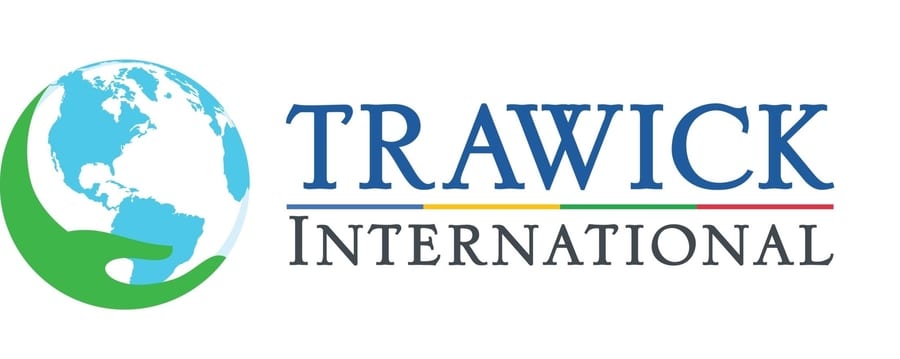
That said, Trawick has limited baggage loss coverage and is better known as a medical-only travel insurance . If you’re a senior traveler or want coverage during your trip for a pre-existing condition, this could be a great option since some plans offer this benefit. Some add-ons, such as rental car coverage and Cancel For Any Reason (CFAR), are also available.
While the trip cancellation and interruption benefits are good, the amount of emergency medical coverage is relatively low. The plan we looked at provides similar coverage to Heymondo but at a higher price. Also, Trawick International doesn’t pay your medical expenses upfront, so you’ll have to pay out of pocket and then file a claim for reimbursement.
Remember, you should look at more than just the price when purchasing health insurance for traveling to Japan . The types of coverage below are must-haves for any policy:
Emergency medical expenses
Emergency medical coverage is the amount your insurer will pay for any doctor’s visits, tests, treatments, and hospitalizations you need if you get sick or hurt. You want this amount to be as high as possible, especially when looking for Japanese travel insurance .
Important ! Read through the conditions and exclusions, so you know exactly which illnesses and incidents are included.
Repatriation & early return
Repatriation will cover the transportation costs involved in sending you back to your home country due to serious illness, injury, or death. This type of coverage is usually included in Japanese travel health insurance , but it’s always a good idea to double-check.
Along the same lines, early return coverage pertains to situations where you must go home early due to an unforeseen event.
Baggage loss, delay & theft
Luggage issues are all too common while traveling, so this type of coverage is a no-brainer. It’s especially important in big cities like Tokyo and Osaka, where pickpockets like to target tourists. Of course, there can also be problems with the airline losing your bags.

Make sure your travel insurance to Japan includes this benefit so you can replace your clothes and toiletries without paying out of pocket. If you’re bringing a laptop or camera gear, check if your policy covers electronic equipment (some companies offer it as an add-on).
Trip interruption & cancellation
Trip interruption coverage amounts vary depending on the provider, but it’s another essential component of the best Japanese travel insurance . If something unexpected interrupts your trip, this benefit will cover the incurring costs for accommodation and meals.
Trip cancellation is not always included in travel insurance for Japan, but it’s well worth adding as an extra. You can learn more about this benefit in our guide to the best trip cancellation insurance . Remember, this isn’t the same as Cancel For Any Reason (CFAR) insurance , but I’d look into it if you want the option of canceling your trip and recouping the costs.
Other coverage
Adventure sports protection is another type of coverage you can add to your Japanese travel insurance policy . Activities like scuba diving, whitewater rafting, and bungee jumping fall under this category. Even hiking at high altitudes is considered risky, so I recommend adding this coverage if you plan on participating in extreme sports and activities.
Finally, natural disasters like tsunamis, typhoons, and earthquakes aren’t uncommon in a country like Japan. Including this type of protection in your policy is a good idea .
Now that you know the best Japanese travel insurance companies and what your plan should cover, here are some final tips:
- Look for the best coverage : Rather than focusing on the price of the policy, look at the amount of medical coverage it includes. It’s better to pay a little more for the best coverage. For example, Heymondo isn’t the cheapest option, but it has excellent protection benefits.
- Choose a company that pays your bills upfront : When you get hurt or sick while abroad, you don’t want to think about the medical bills; you just want to get treatment. The best Japanese travel insurance will pay your healthcare expenses upfront so you can focus on recovering. This is another reason why we love Heymondo . Other companies make you pay out of pocket and file lots of paperwork so you can get reimbursed, and in a country like Japan, the prices can be steep.
- Consider the onboarding process and policy contract : An insurer’s website and onboarding process can tell you a lot. Getting a quote should be fast and straightforward. Also, make sure you can read through all the terms and conditions before buying.
- Pay attention to the company’s customer service : This is an integral part of having travel insurance for Japan . No matter the time, you want to be able to contact customer service and get assistance in your language. Heymondo has a convenient 24/7 app to chat with a doctor and access your insurance documents.
If you’re still wondering if travel insurance is worth it for a trip to Japan, my answer is a resounding yes! While Japan is a safe country, it’s impossible to predict the future, so it’s better to be covered for unforeseen injuries, illnesses, and events.

Moreover, if you’re visiting big cities like Tokyo, you risk dealing with pickpockets and thieves. Japan is also known for being a site of natural disasters, particularly strong storms and tsunamis. Having a policy with natural disaster coverage and early return benefits is essential.
Heymondo covers all these things and more, so if you choose this Japanese travel insurance , don’t forget to get 5% off with our Heymondo discount code .
FAQs – Travel insurance in Japan
To finish up, here are some common questions and answers about choosing the best travel insurance for Japan :
Do I need insurance to travel to Japan?
No, you don’t need Japanese travel insurance to visit the country. However, I highly recommend it, especially since healthcare in Japan is so expensive.
What is the best travel insurance for Japan?
Heymondo is the best travel health insurance for Japan because it pays your medical bills upfront. Other excellent options include SafetyWing , IMG Global , Travelex , and Trawick International .
How much is travel insurance for Japan?
Travel insurance for Japan ranges from around $1.50/day to $6/day.
The best travel insurance to Japan should cover emergency medical expenses, repatriation, baggage loss, and trip cancellation.
What’s not covered by travel insurance in Japan?
Most policies don’t include adventure sports or Cancel For Any Reason coverage, but you may be able to add these benefits for an extra fee.
That concludes our guide to the best travel insurance for Japan ! I hope this article helps you pick the perfect plan for your needs so you can enjoy your trip in total confidence. If you have any questions or want to share your experience with one of these Japanese travel insurance companies , please leave me a comment below. I’d love to hear from you!
Stay safe, and have a great time in Japan!
Ascen Aynat

Leave a Reply Cancel reply
Your email address will not be published. Required fields are marked *
This site is protected by reCAPTCHA and the Google Privacy Policy and Terms of Service apply.

Follow our adventures and trips on instagram
Photography Tours
Iceland Photo Tour
Lofoten Islands Photo Tour
Death Valley & Alabama Hills Photo Tour
Monument Valley Photo Tour
Arches & Canyonlands Photo Tour
La Palma Photo Tour
Dolomites Photo Tour
Swiss & French Alps Photo Tour
Atacama & Uyuni Photo Tour
Patagonia Photo Tour
Photography resources
Online Photography Courses
2024 Milky Way Calendars
Photography Basics
Best Camera Settings
Milky Way Photography
Northern Lights Photography
Best Time to See the Milky Way
Travel Guides
NYC Travel Guide
Las Vegas Travel Guide
Grand Canyon Travel Guide
Antelope Canyon Travel Guide
Lanzarote Travel Guide
Fuerteventura Travel Guide
Iceland Travel Guide
Tromso Travel Guide
Bali Travel Guide


IMAGES
VIDEO
COMMENTS
Some credit card companies also offer travel insurance coverage. Please ask your card provider for further details on the insurance coverage before leaving. Since 2021, foreigners who have unpaid medical expense in Japan may be …
For example, travel cards, such as the Chase Sapphire Reserve ® and The Platinum Card ® from American Express, frequently offer travel insurance benefits such as trip cancellation and interruption, rental car …
We put together the complete guide to travel insurance coverage options for trip cancellation and medical emergencies to ensure a smooth journey in Japan. Credit cards View all credit cards
TOKIO OMOTENASHI POLICY is an overseas insurance policy in case of sudden illness or injury for foreigners visiting Japan and or Japanese national’s returning to Japan temporarily for up to 31 days that can be purchased online.
Travel insurance: Many card issuers work with different providers to offer credit card travel insurance. This could include trip delay reimbursement, lost luggage coverage, car rental insurance, and more. 4. Foreign transaction …
Travel Benefits: Comes with complimentary travel accident insurance when you use the card to book travel. The Rakuten Credit Card is an excellent choice for those who love to shop and want to make every yen spent …
Having a Japanese credit card allows those staying long-term in Japan for work or study to save yen, get points and discounts, and build credit. In this article, we recommend Rakuten, EPOS, and other foreigner-friendly credit …
Please check the ANA Card Travel Insurance Guide (Text is available in Japanese only.) before making your inquiry.
Find the best travel insurance for Japan. Learn what travel health insurance for Japan includes, plus costs and requirements.